John Walker:
Maker and Witness
An exhibition of archival material held by the Virginia Theological Seminary Archives at the Bishop Payne Library
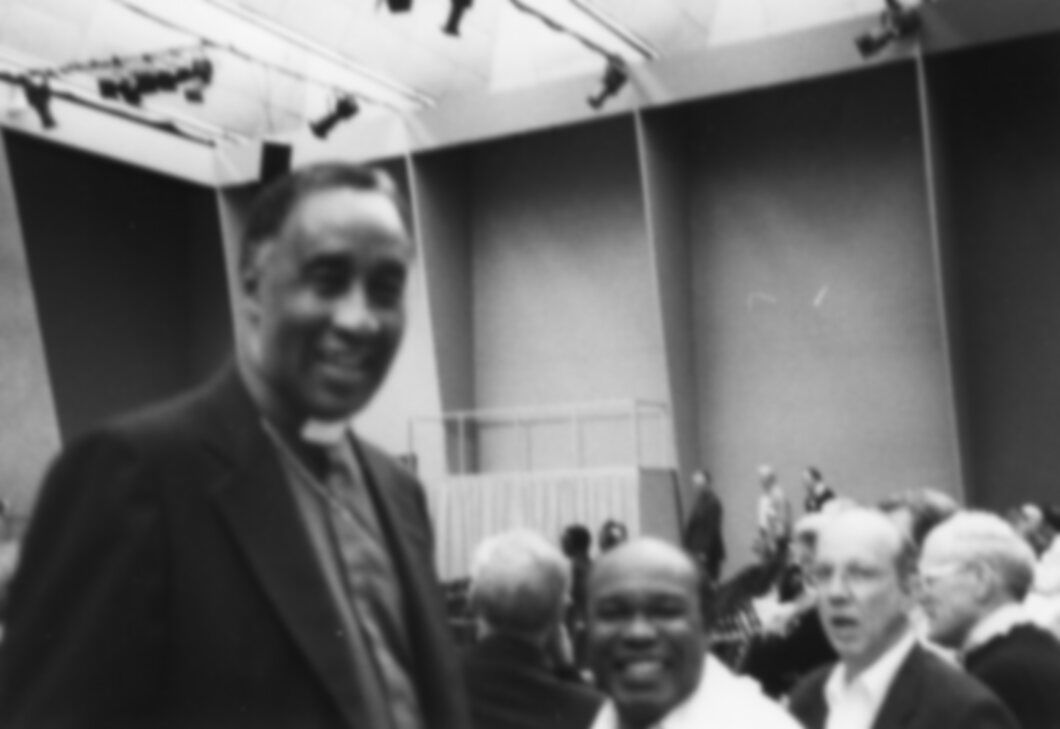
Introduction
The Rev. Martin Luther King Jr. once admonished his congregation not merely to be made by history but to be its maker.
The Rt. Rev. John T. Walker was a man who lived into this ideal. Walker shaped, influenced, and witnessed the course of history from his entrance into Virginia Theological Seminary as the first African American student to being the First Bishop of Color to lead the Episcopal Diocese of Washington. Walker advocated for racial justice and the ending of South African apartheid, and worked alongside the U.S. Federal Government, and D.C., and state governments.
This digital exhibit explores Bishop Walker's many intersections with American and world history.
The First
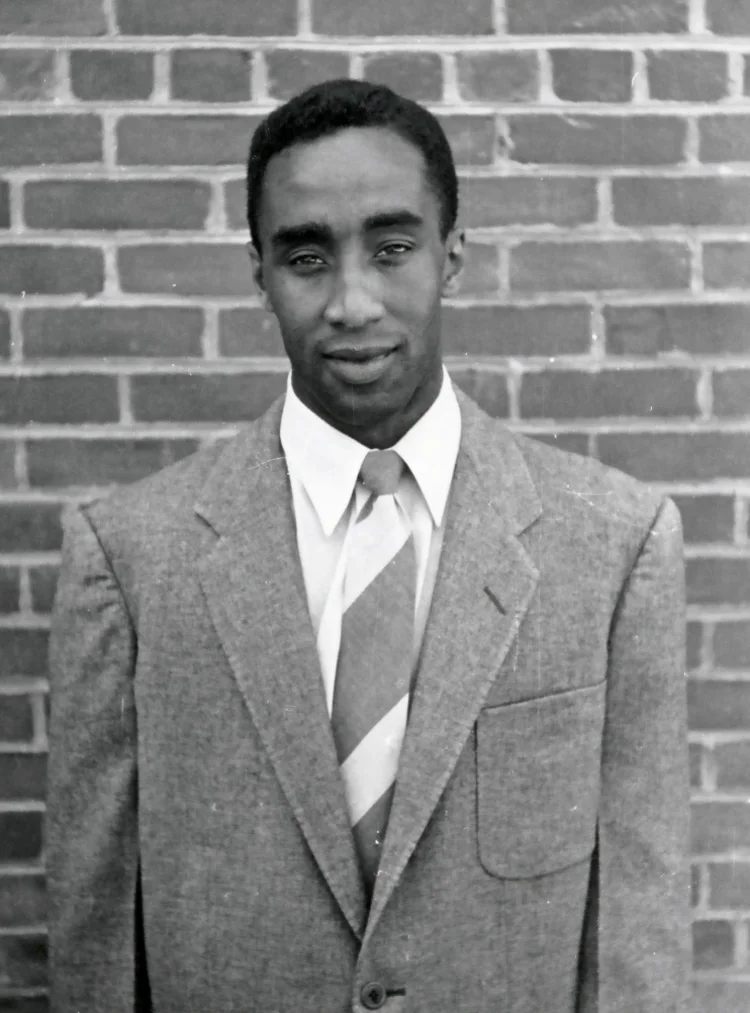
John Walker was not a person content to be passively shaped by history's forces, but instead transformed history through his life and work.
In his own Episcopal Church, he became a trailblazer for many African Americans. He was the first African-American graduate from Virginia Theological Seminary, the first African American canon of the National Cathedral, and the first African American to be consecrated the Bishop of Washington.
Throughout his life, John Walker broke barriers and blazed the trail for equity and racial justice in the Episcopal Church.
John T. Walker personally desegregated Virginia Theological Seminary with his presence as a student in 1951.
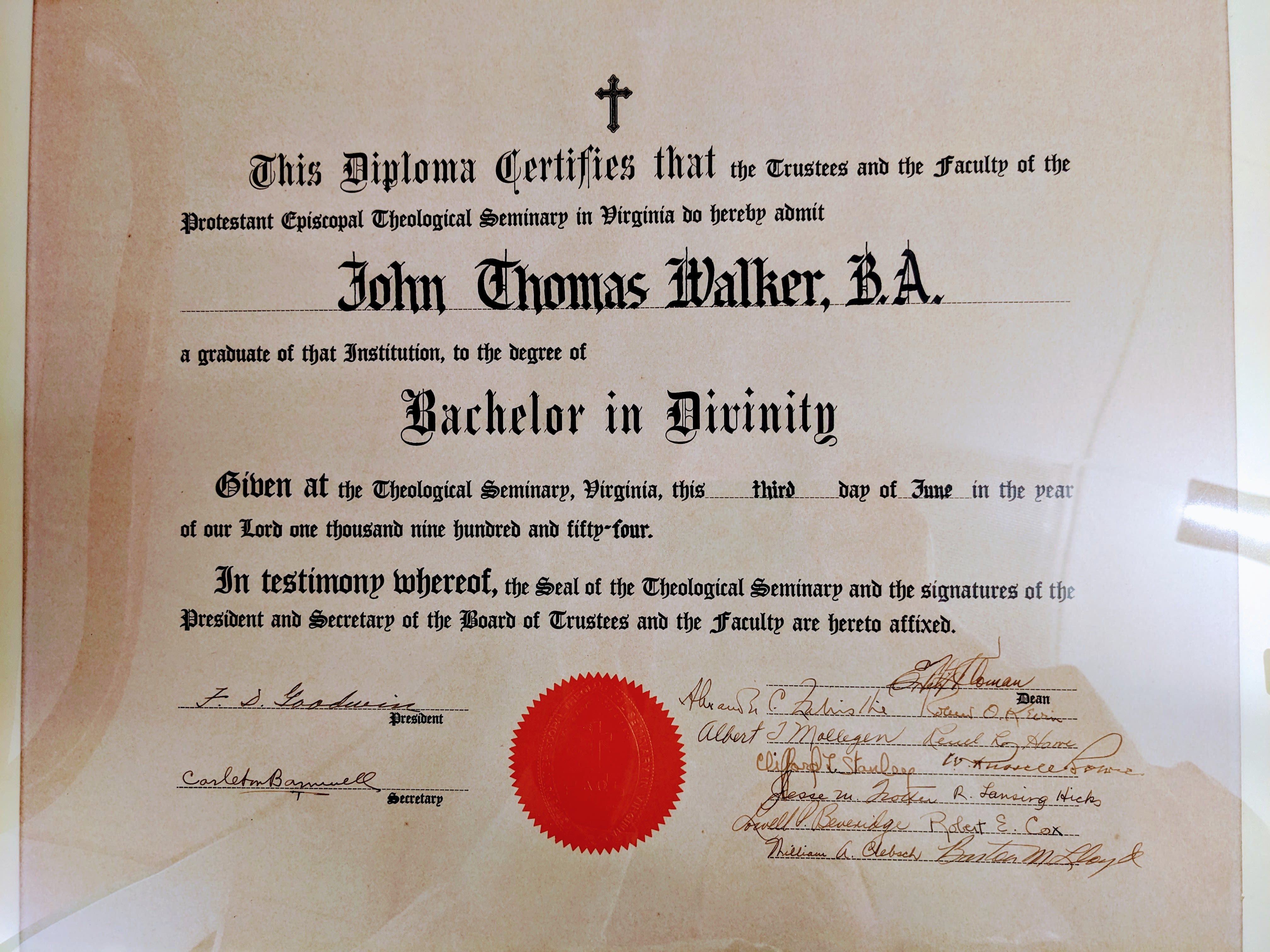
Bachelor of Divinity diploma from Virginia Theological Seminary, 1954 (M182 Box 45 10)
Bachelor of Divinity diploma from Virginia Theological Seminary, 1954 (M182 Box 45 10)
John T. Walker was sent to study at Virginia Theological Seminary by the Rt. Rev. Richard Emrich of Michigan. When he arrived in 1951, he was personally responsible for racially integrating the school. In 1954, Walker became the first African American graduate from VTS.
In 1971, Walker was elected as Bishop Suffragan of the Diocese of Washington after working at the Cathedral as a canon.
In the above-right displayed letter, Walker reflects upon his time as canon and looks forward to his duties as Bishop Suffragan, the consecration proclamation is displayed to the right.
In 1977, John Walker became the first African-American Bishop of the Diocese of Washington.
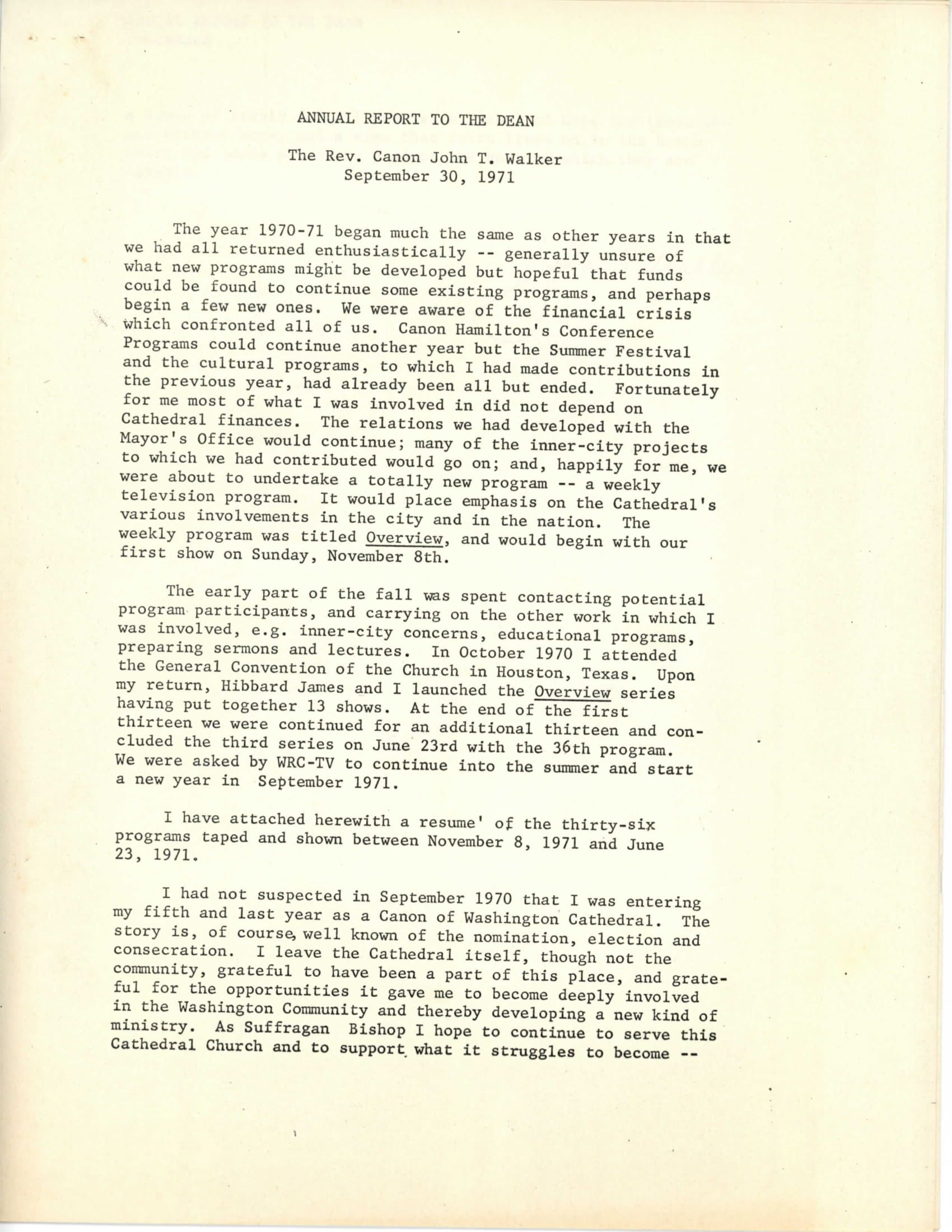
Canon's report to the dean of the National Cathedral (M182 Box 21 4)
Canon's report to the dean of the National Cathedral (M182 Box 21 4)
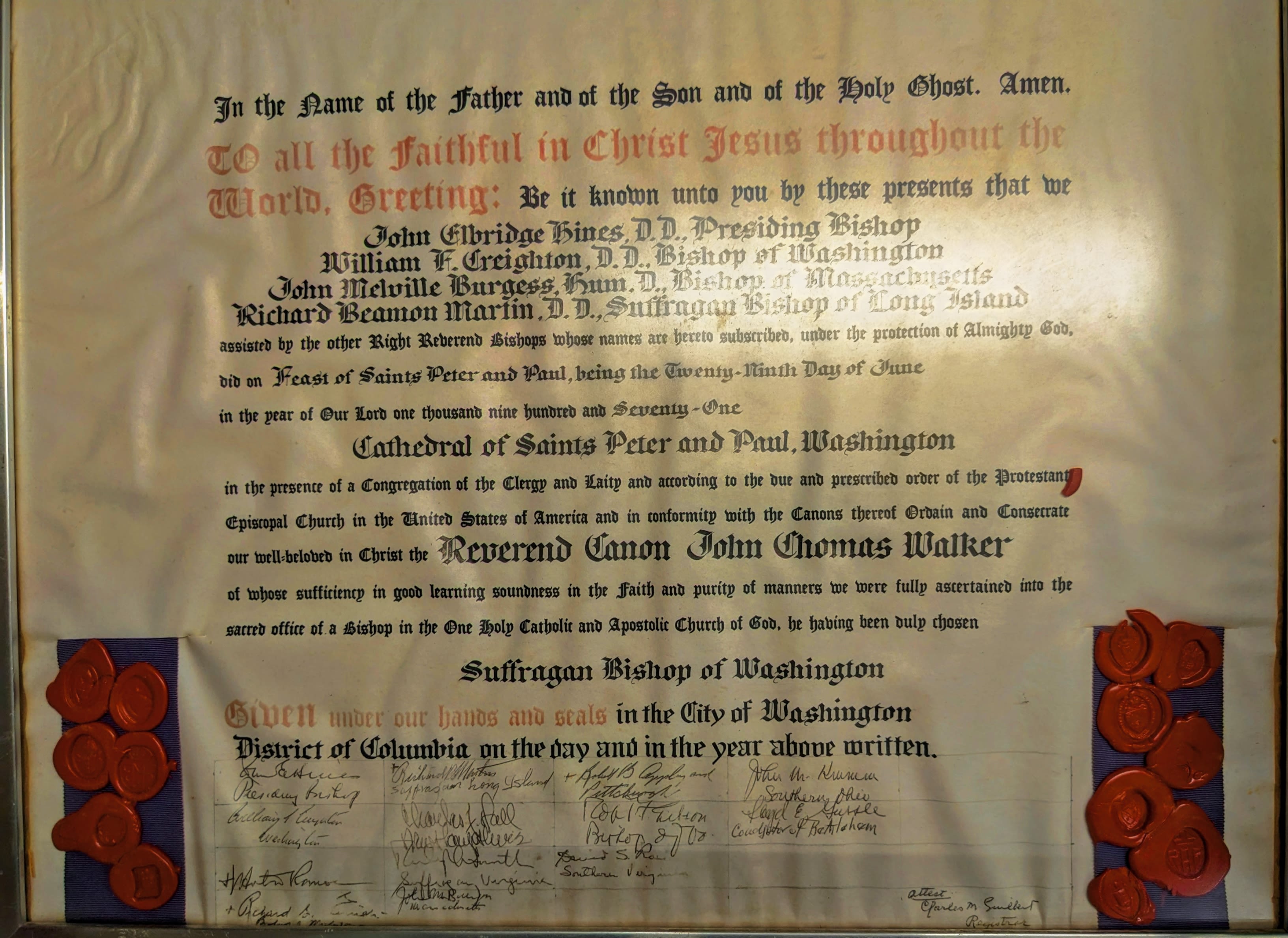
Consecration proclamation as Suffragan Bishop of Washington with wax seals (M182 Box 45 16)
Consecration proclamation as Suffragan Bishop of Washington with wax seals (M182 Box 45 16)
The Advocate
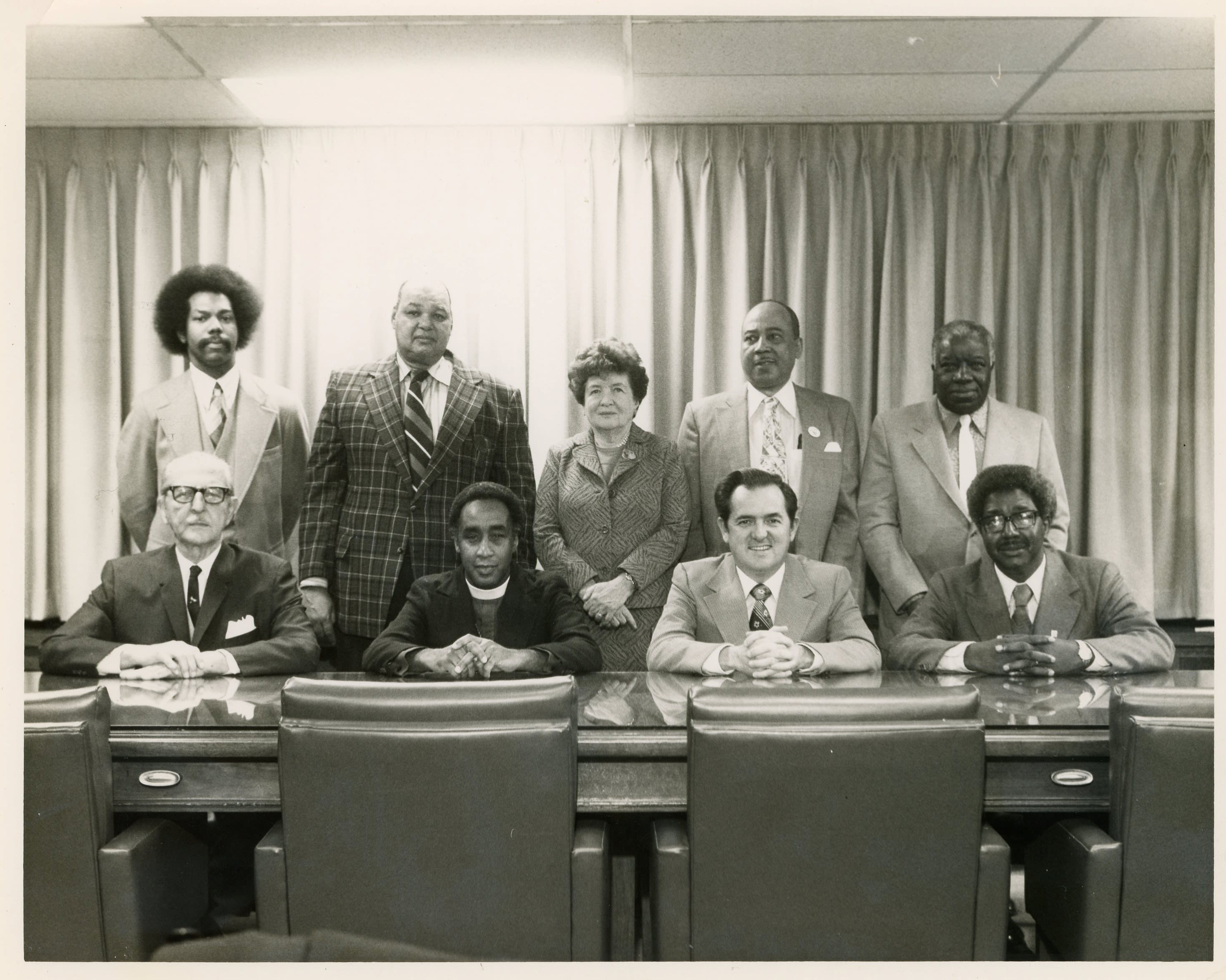
No matter his vocation in life (student, priest, bishop), John Walker used his voice, intellect, and influence to fight for social change.
As a student, he researched the ramifications of poverty, racism, and injustice. During his career, he served on public advisory panels, and as a bishop, he utilized the privilege of his position to argue and advocate for reform in housing, employment, and policing.
His passionate advocacy was not limited to the United States. He vigorously strove to end Apartheid in South Africa, which led to his founding of the international organization Africare.
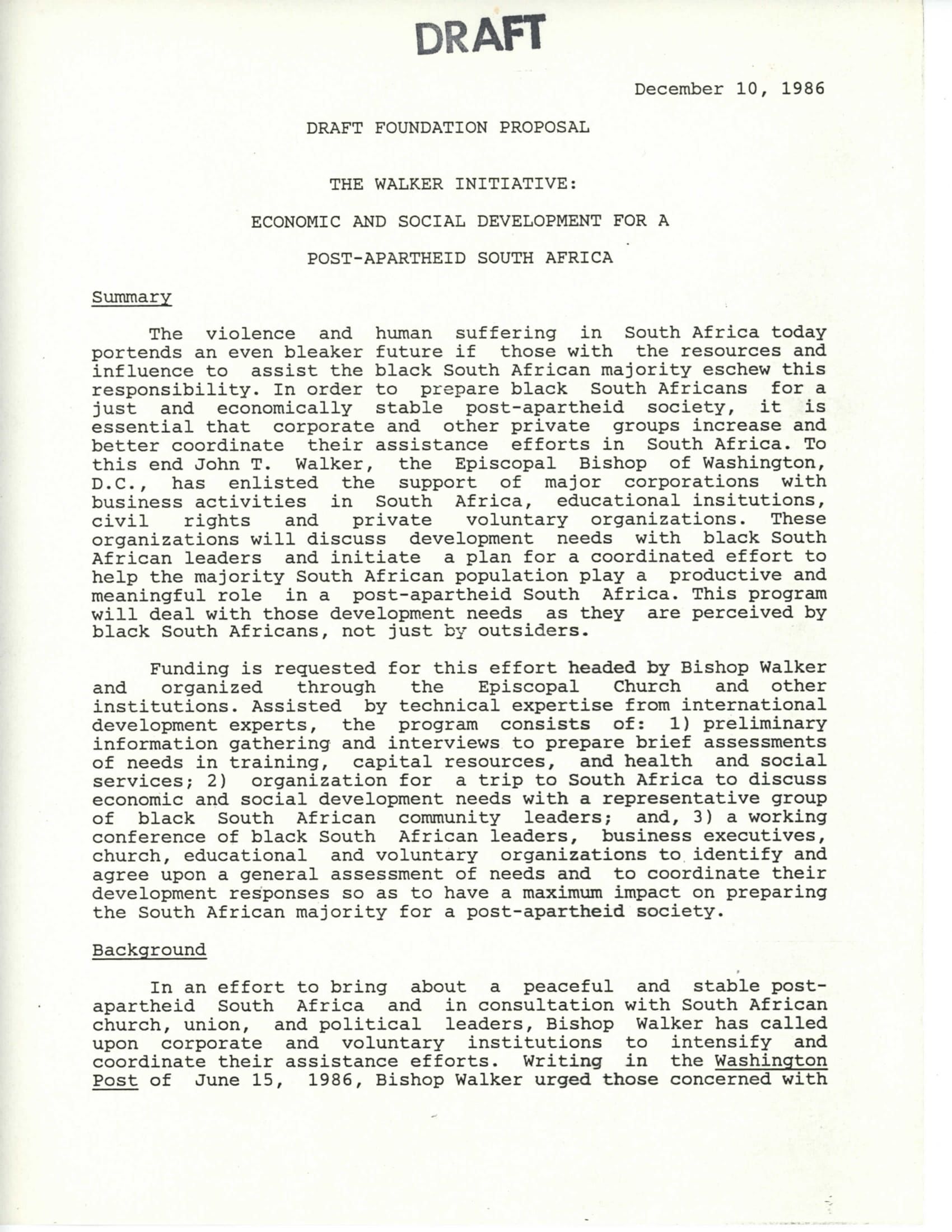
Draft, Foundation Proposal, The Walker Initiative: Economic and Social Development For A Post-Apartheid South Africa. (M182 Box 34 25)
Draft, Foundation Proposal, The Walker Initiative: Economic and Social Development For A Post-Apartheid South Africa. (M182 Box 34 25)
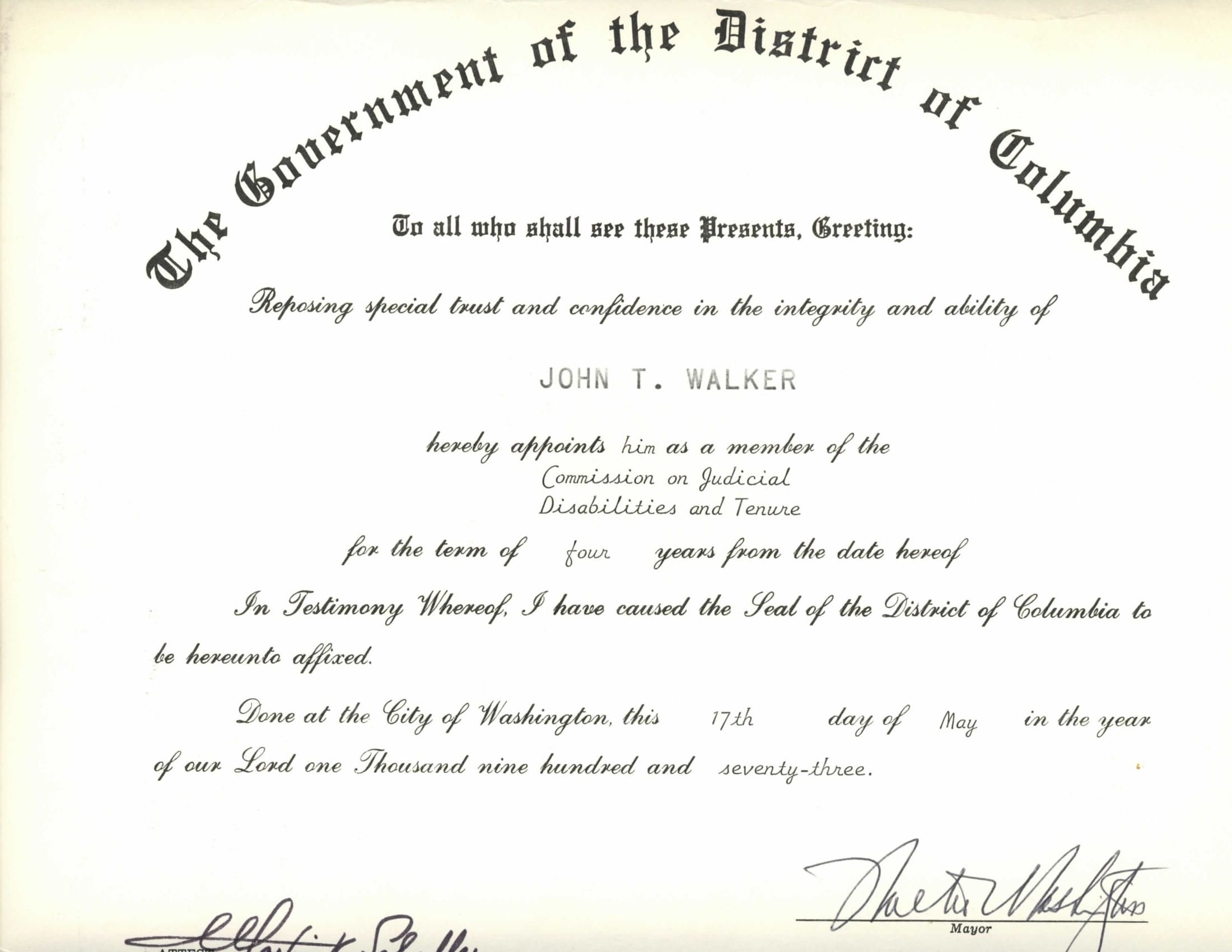
Certification of appointment to the DC Commission on Judicial Disabilities and Tenure (M182 Box 19 11)
Certification of appointment to the DC Commission on Judicial Disabilities and Tenure (M182 Box 19 11)
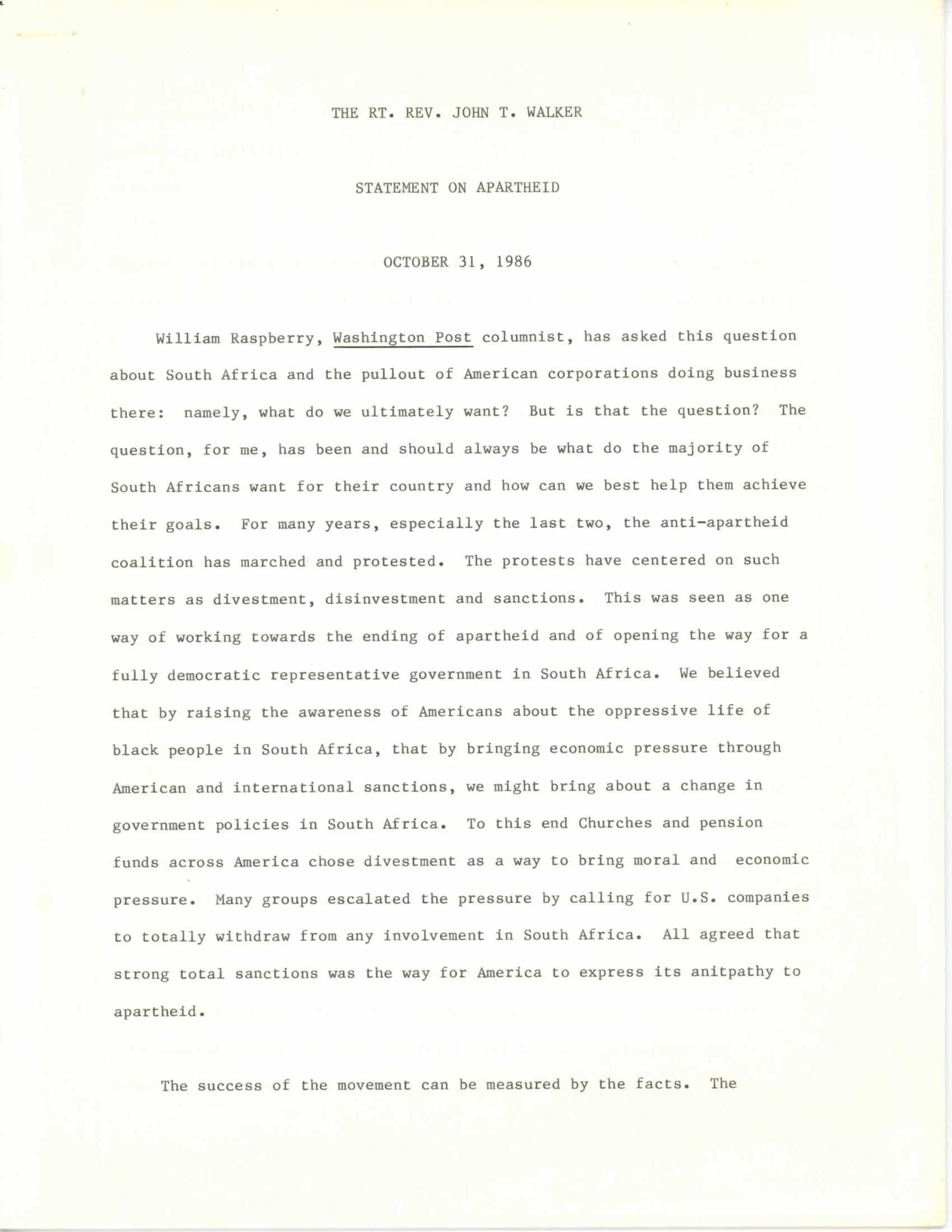
Statement on Apartheid, Oct 31 1986 (M182 Box 34 20)
Statement on Apartheid, Oct 31 1986 (M182 Box 34 20)
Many of his sermons address themes of racism and social justice, and Walker tirelessly strove for a national holiday that would recognize Martin Luther King, Jr. His efforts would bear fruit when, in 1983, President Ronald Reagan signed the newly created federal holiday into law. A copy of the signed proclamation is in the in-person exhibit at the Bishop Payne Library.

"The New Utopia," writings, racism (M182 Box 34 16)
"The New Utopia," writings, racism (M182 Box 34 16)
As bishop of the Diocese of Washington, Walker was asked to sit on a number of local government committees, including an advisory council to the DC Police department and one on potential reformations to the legal system.
The Witness
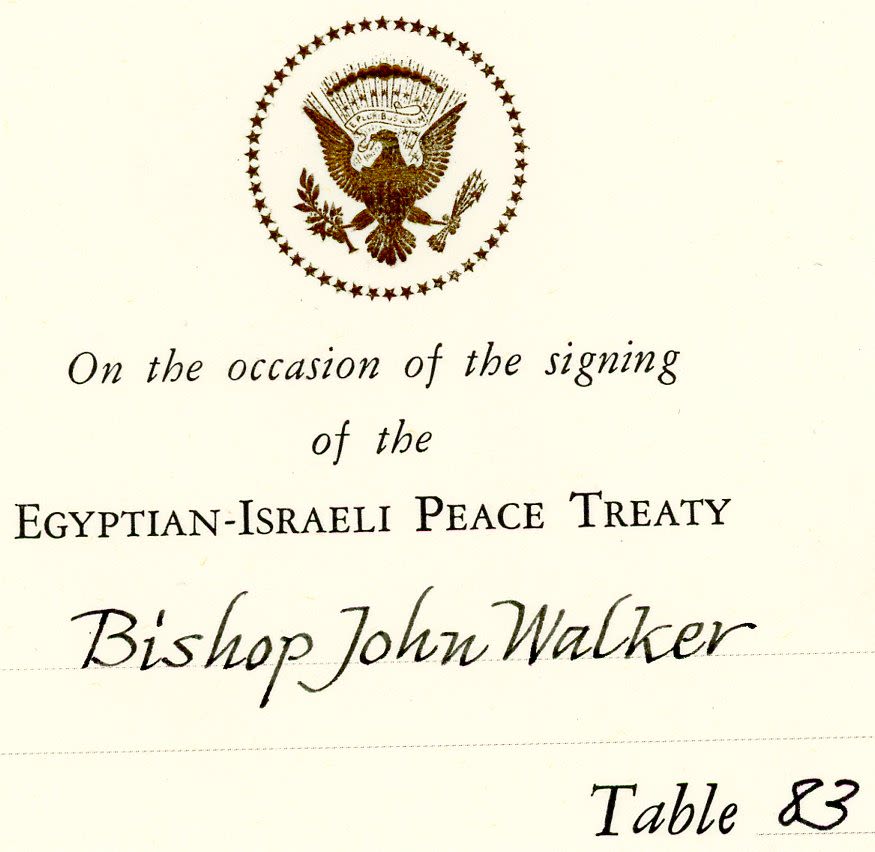
Intersectionality was a prominent theme of John Walker’s life.
His ministry as priest and bishop was during the tumultuous years of the Civil Rights Movement, the Vietnam War, the rise of American conservatism, and the collapse of European colonization of Africa.
His location as Bishop of Washington placed him in the middle of national and international events, where he used his influence and presence to move societies and governments toward change.
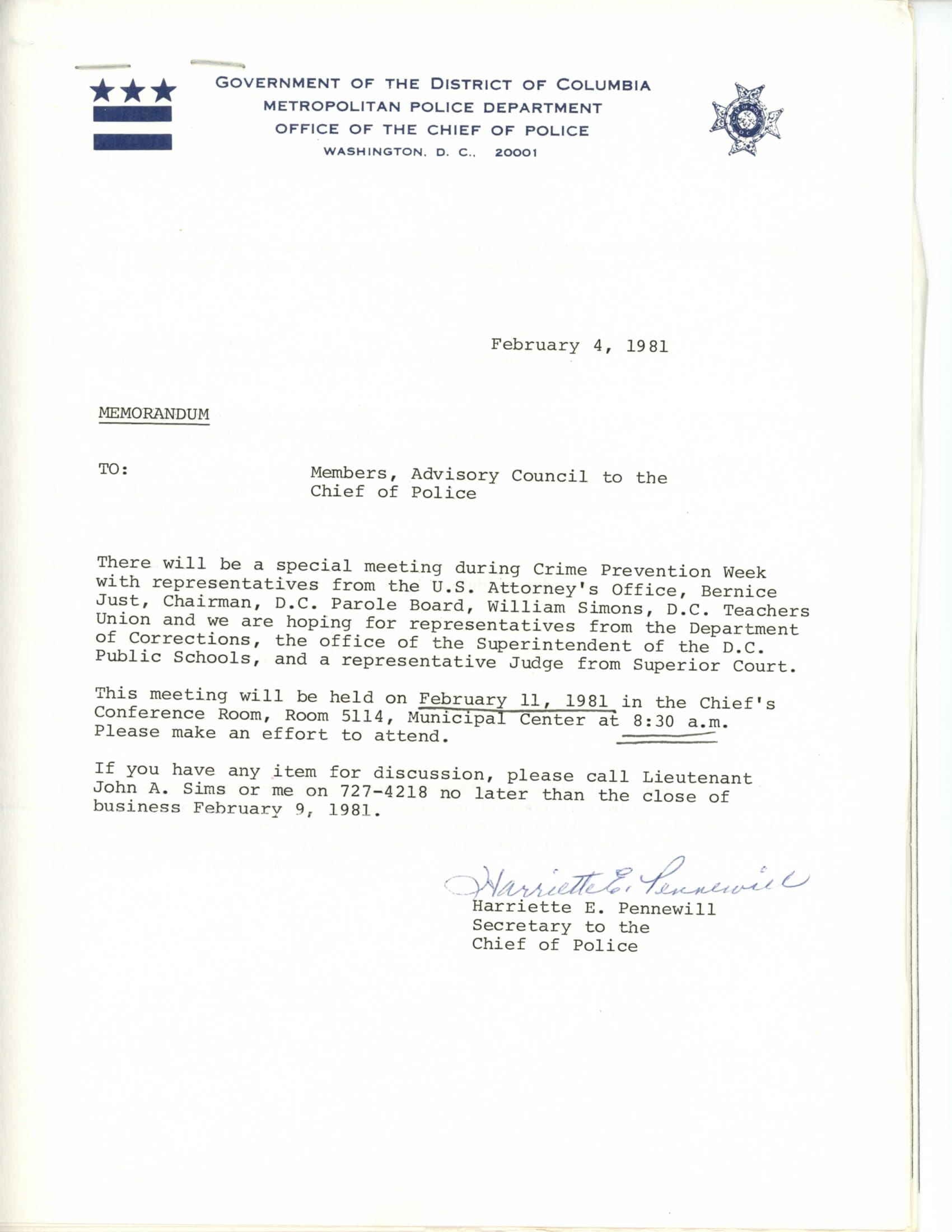
Invitation to meeting of the Citizen’s Advisory Council to the Chief of Police, 1975-1983 (M182 Box 18 5)
Invitation to meeting of the Citizen’s Advisory Council to the Chief of Police, 1975-1983 (M182 Box 18 5)
Walker was invited to speak with the US Senate Foreign Relations Committee on the subject of South Africa. As Walker had long considered the evils of Apartheid, he pressed the senators to take quick action for the betterment of the South African people. In his testimony printed below, Walker remarks that the situation in South Africa "is not simply a crisis of black and white. It is a human crisis, a fight for justice, for the preservation of the soul, for the substance of humanity - theirs and ours."
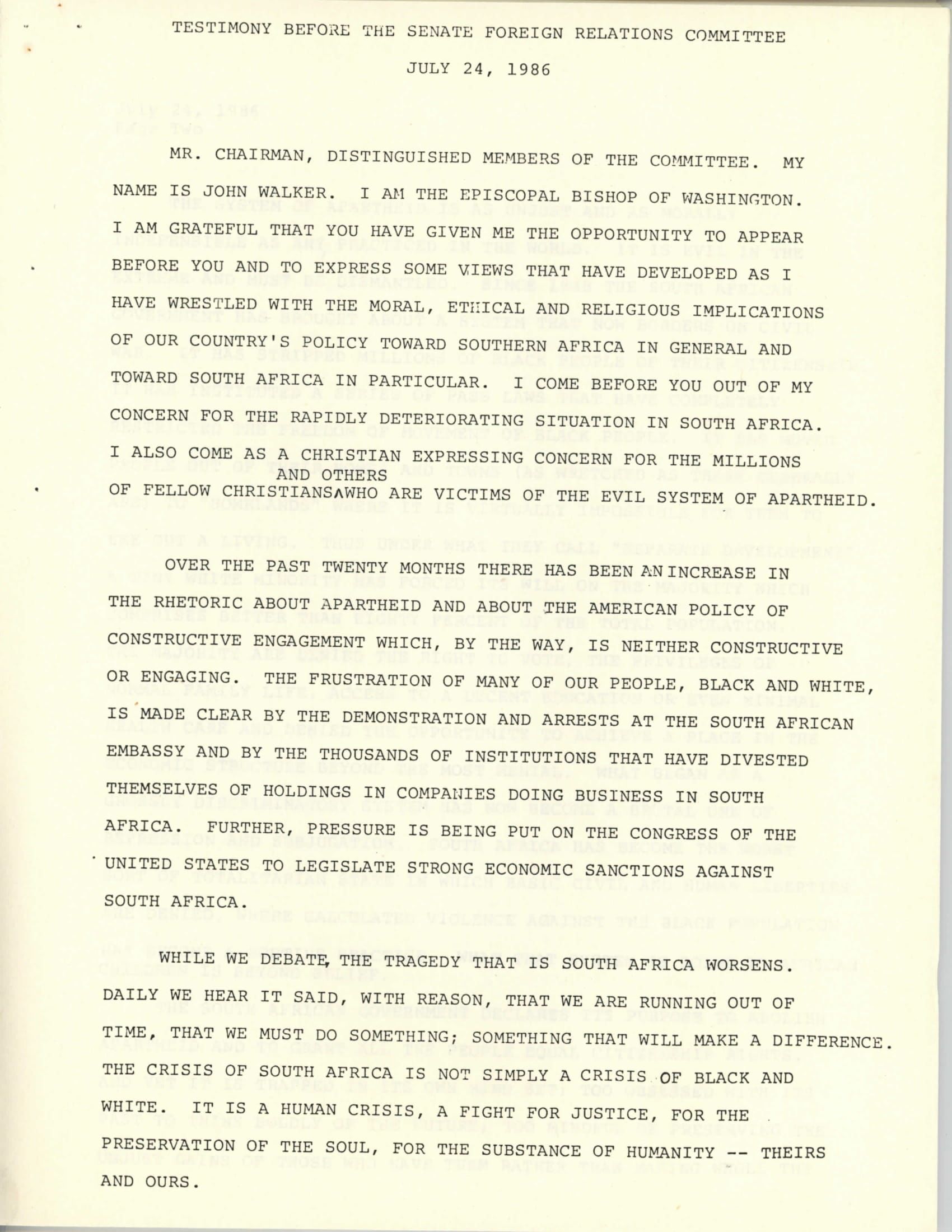
Testimony on Apartheid before US Senate, 1988 (M182 Box 15 24)
Testimony on Apartheid before US Senate, 1988 (M182 Box 15 24)
A few years prior, Walker was invited to the enthronement service for Archbishop Desmond Tutu in the Anglican Province of Southern Africa. As Tutu himself recounts, this experience left in Walker a strong sense of moral duty.
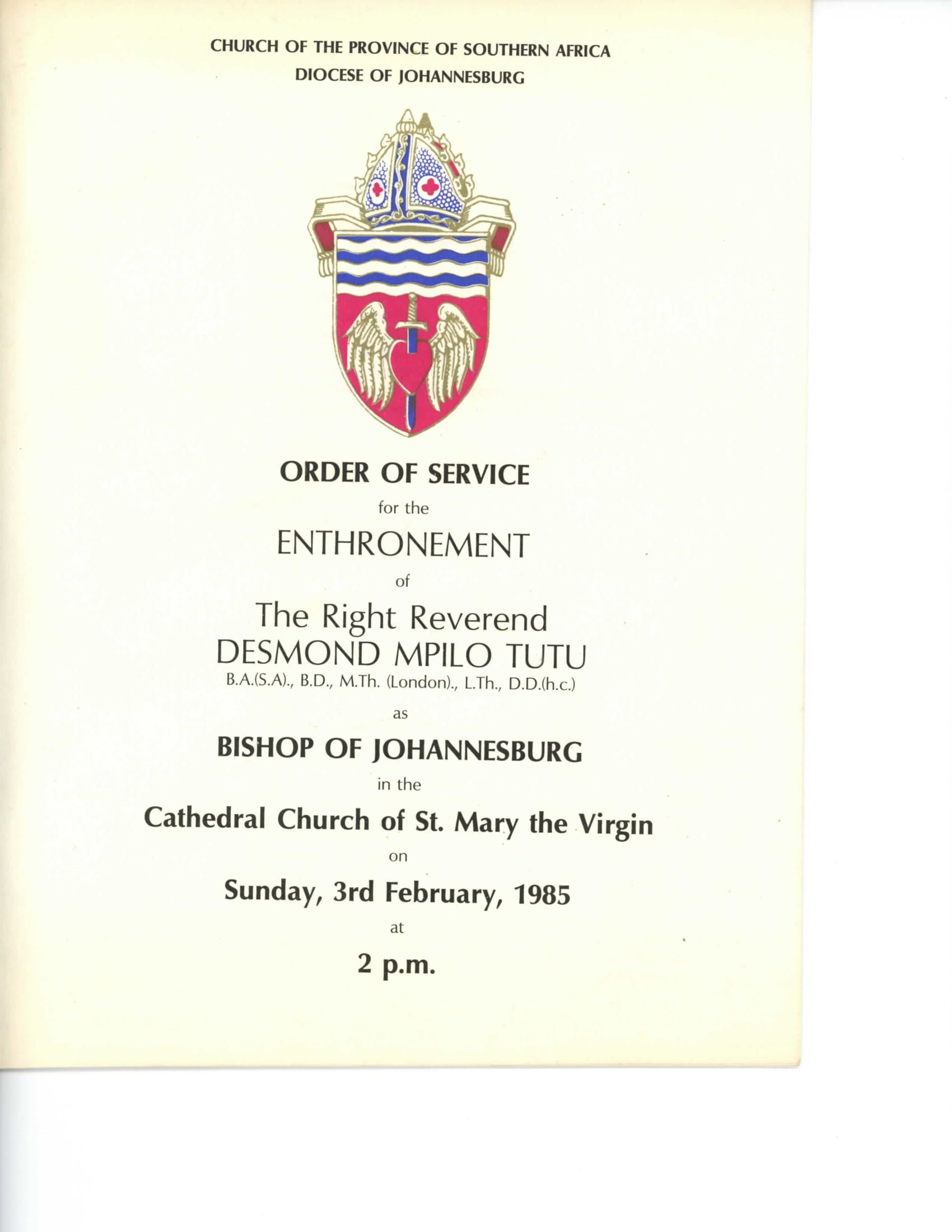
Program, Enthronement of Bishop Desmond Tutu (M182 Box 6 8)
Program, Enthronement of Bishop Desmond Tutu (M182 Box 6 8)
"It was a great joy to have [John] and Mrs. Walker visit Cape Town for my enthronement as Archbishop. They were deeply moved by what they saw of the ravages and iniquities of the repressive system of apartheid, and this reinforced his resolve to work assiduously for the demise of that awful system. He cared for all of Africa and poured out relief through his beloved Africare."

Invitation from President Carter to White House for Egyptian-Israeli Peace Treaty signing, 1979 (M182 Box 14 13)
Invitation from President Carter to White House for Egyptian-Israeli Peace Treaty signing, 1979 (M182 Box 14 13)
President Jimmy Carter met Walker a number of times and knew him to be a fierce advocate of international justice. This invitation to the signing of the Egyptian-Israeli Peace Treaty in 1979 provides one example of how Walker's efforts led to his witnessing of key historical moments in history. While controversial, this peace treaty remains in effect today.
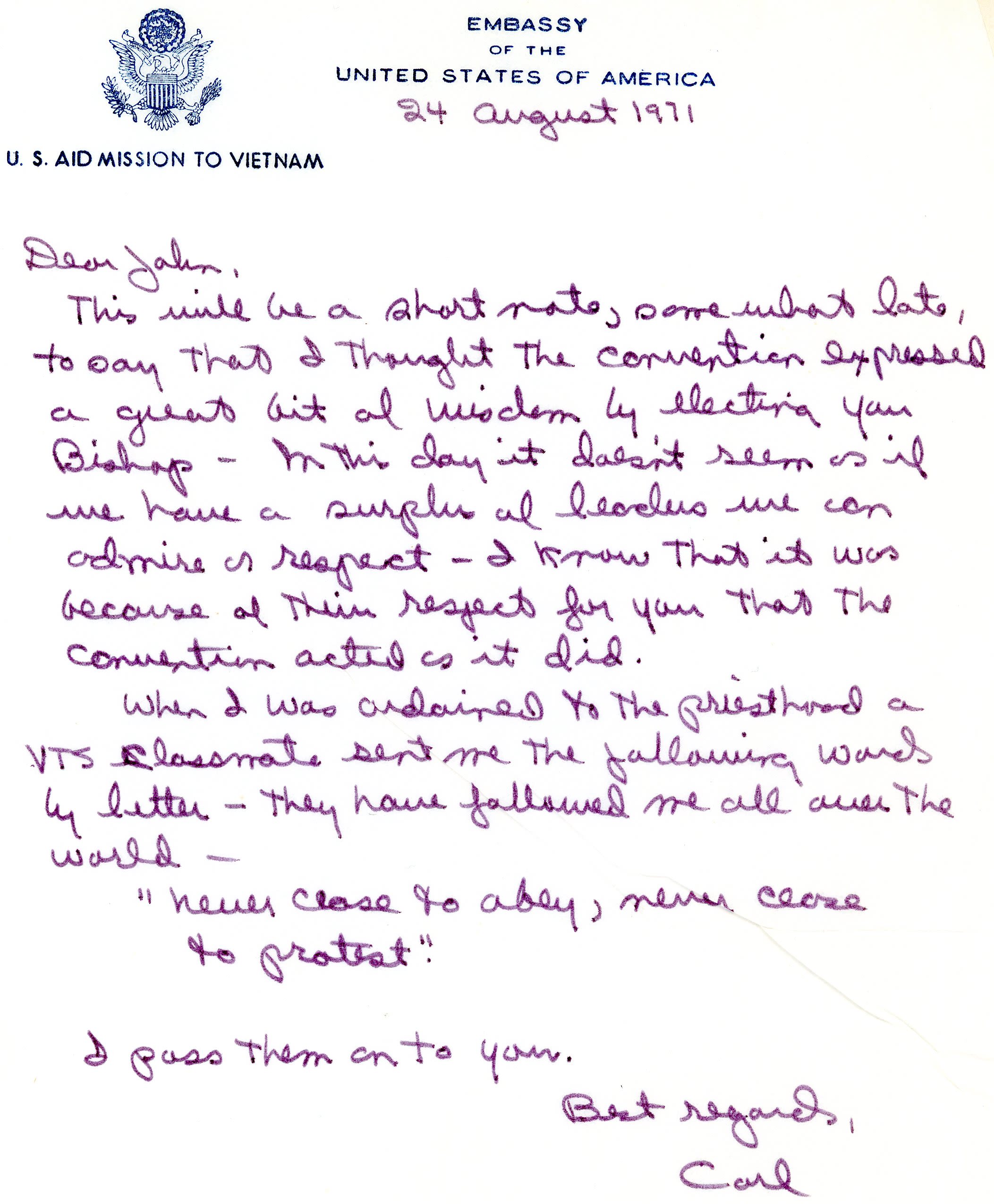
Letter from US Aid Mission to Vietnam (M182 Box 26 10)
Letter from US Aid Mission to Vietnam (M182 Box 26 10)
A military chaplain in Vietnam gave his congratulations to Walker upon his election as Bishop Suffragan, noting that Walker was one of the few leaders of his day that people could "admire and respect."
Below, a letter from Walker to the Gay Men's Chorus of D.C. expresses thanks for participating in a service for AIDS in the National Cathedral. When approaching the social problems of the day, Walker strove to build interfaith connections.
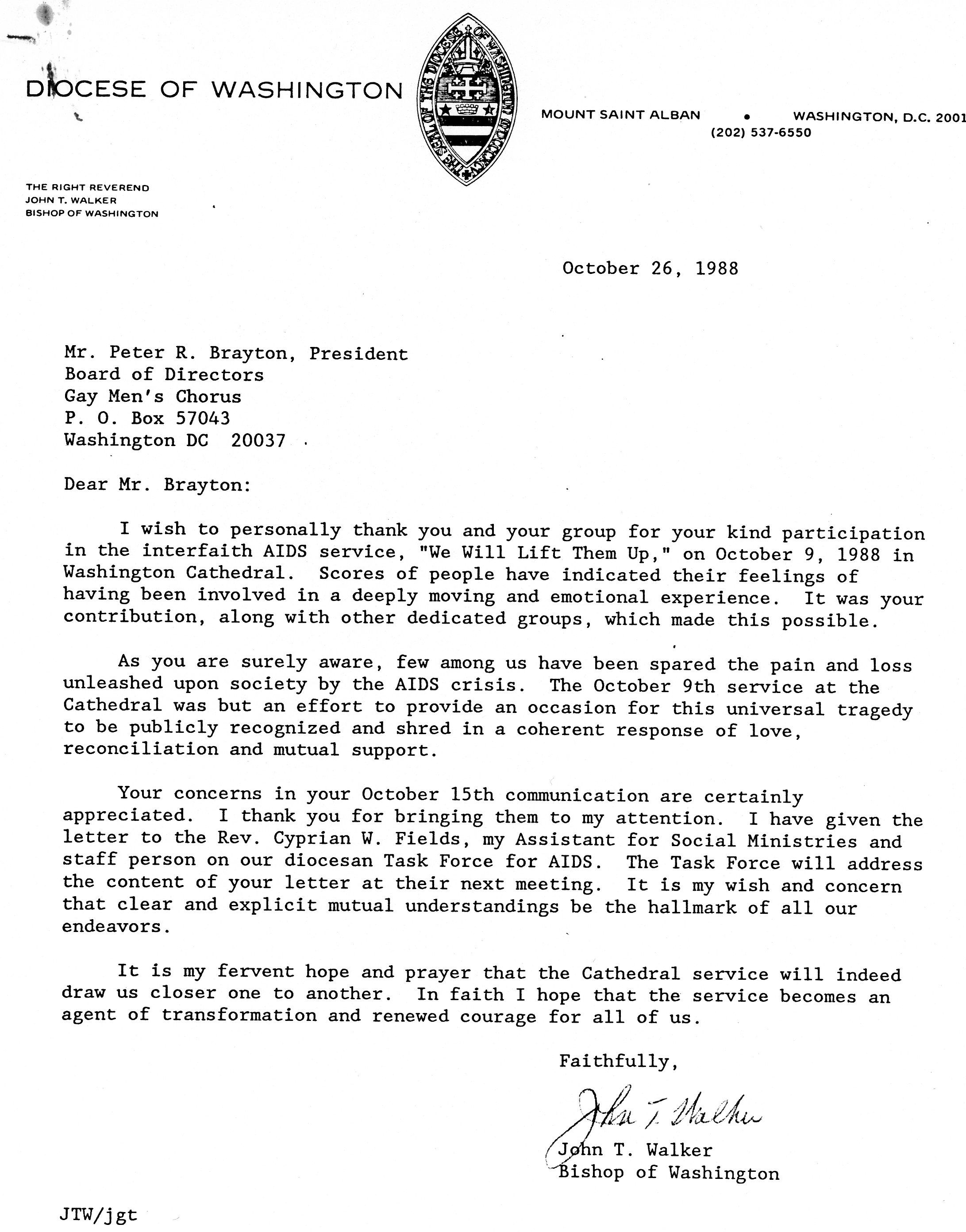
Letter of thanks from Walker to board president of Gay Men's Chorus following interfaith AIDS service at National Cathedral (M182 Box 24 19)
Letter of thanks from Walker to board president of Gay Men's Chorus following interfaith AIDS service at National Cathedral (M182 Box 24 19)
The Legacy
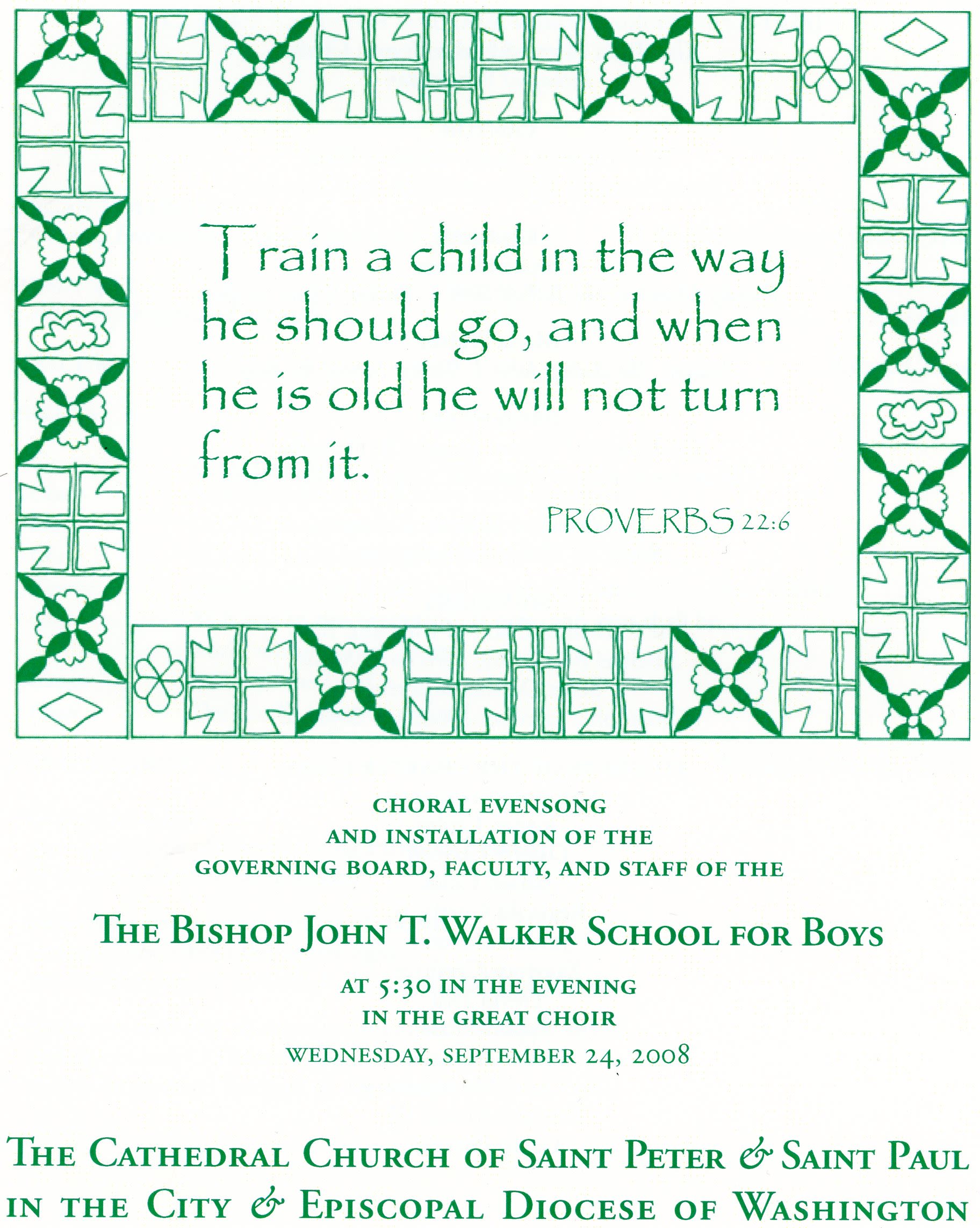
“We only know this: that we are called upon to live in harmony and peace and love with one another.”
Bishop Walker set an example for the faithful to follow.
He understood the gifts of time, knowledge, wisdom, and influence. He used these gifts to better the lives of his fellow African Americans, the impoverished, the victims of HIV/AIDS, religious minorities, and the oppressed. He repeatedly admonished the church to simply start somewhere for reconciliation ministry. These efforts, Walker argued, begin when individuals decenter themselves and work for the cause of those around them.
His work is carried on in the various organizations he founded, and those that carry out their work in his memory.
The program displayed on the right, a festival Eucharist celebrating Walker's life, extends the reconciliation themes of his ministry. The Bishop John T. Walker Memorial Scholarship Prayer Breakfast at St. Timothy's Episcopal Church in Washington continues to be held annually, as is the annual evening prayer service at the National Cathedral celebrating the Bishop John T. Walker School for Boys.
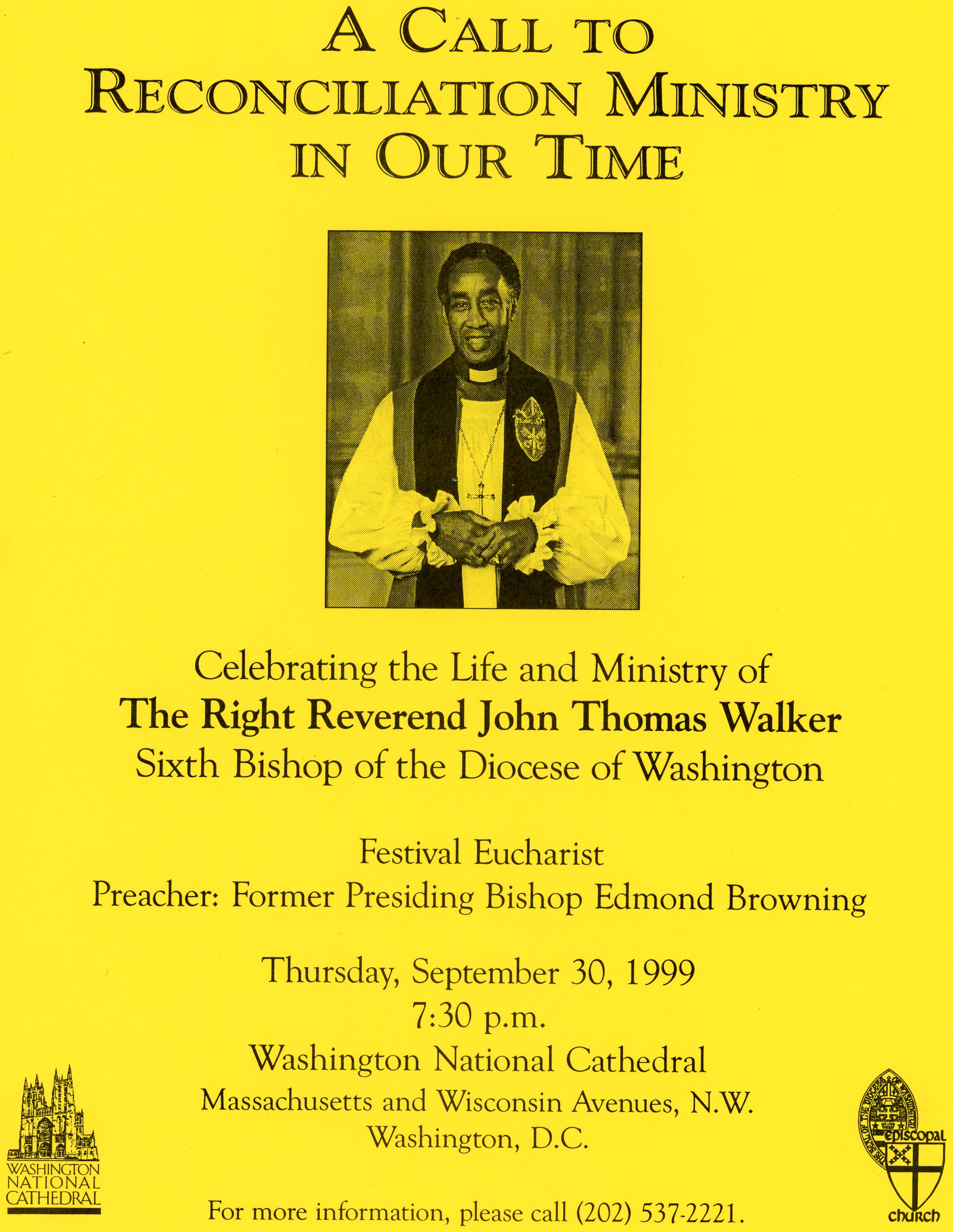
Program, Sep. 30, 1999 Eucharist celebrating Walker's life and ministry (M182 Box 38 22)
Program, Sep. 30, 1999 Eucharist celebrating Walker's life and ministry (M182 Box 38 22)
We hear it said again and again that we have to begin somewhere. We invite you to join us here and now in our search for reconciliation and peace. Our true ministry is not finally against anyone, but rather it is for justice, truth, and peace in reconciling love for everyone.
In 2006, the Episcopal Diocese of Washington founded the Bishop John T. Walker School for Boys. The school offers tuition-free education for boys in the District's Anacostia neighborhood. The school carries on Walker's legacy of meeting the concrete needs of our neighbors.

Program, Installation of governing board, faculty and staff, Bishop John T. Walker School for Boys (M182 Box 37 20)
Program, Installation of governing board, faculty and staff, Bishop John T. Walker School for Boys (M182 Box 37 20)
Holy Comforter Episcopal Church in D.C. established the John Walker Learning Center for early childhood education in 2009.
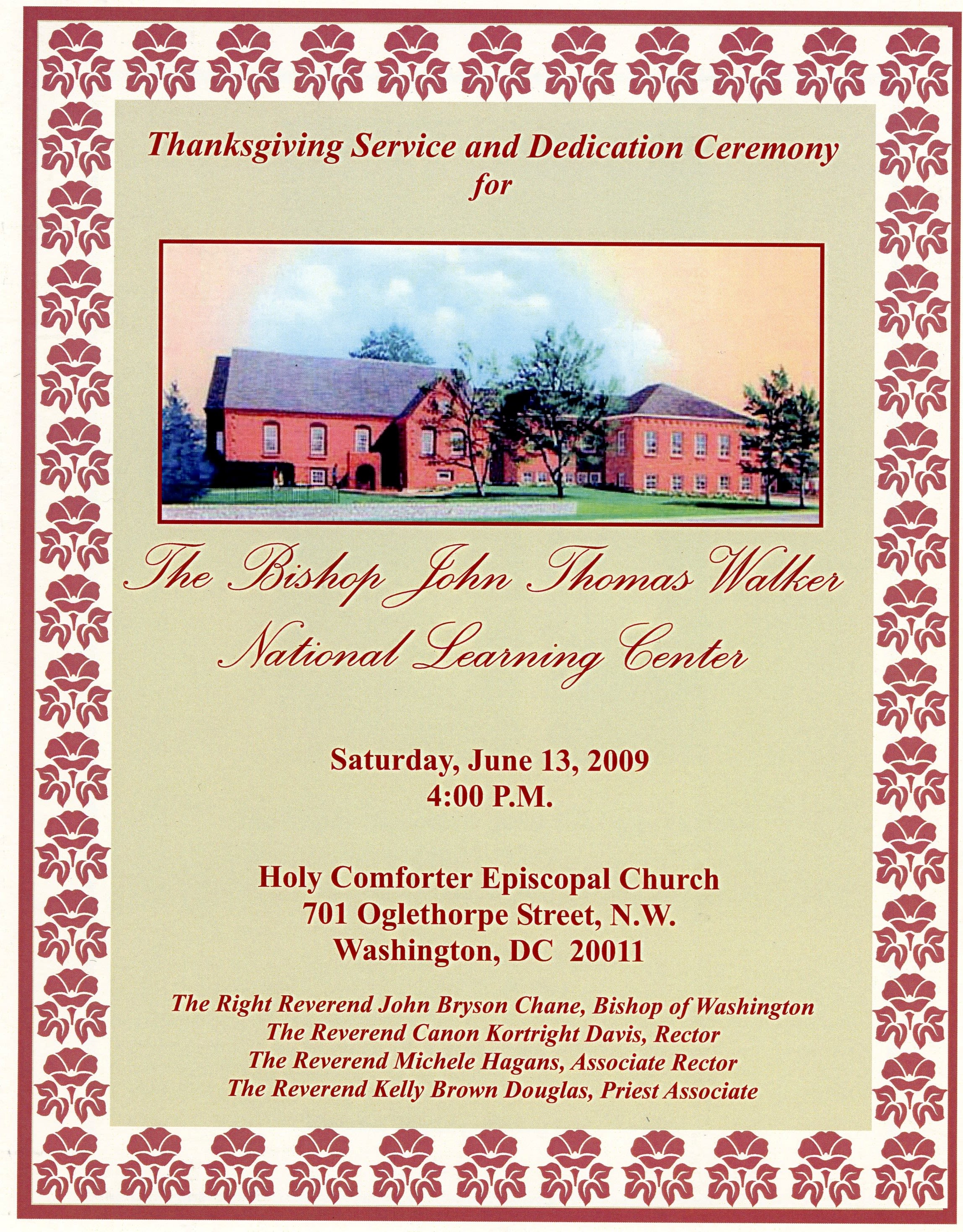
First page, Dedication of Bishop John Thomas Walker National Learning Center (M182 Box 38 19)
First page, Dedication of Bishop John Thomas Walker National Learning Center (M182 Box 38 19)
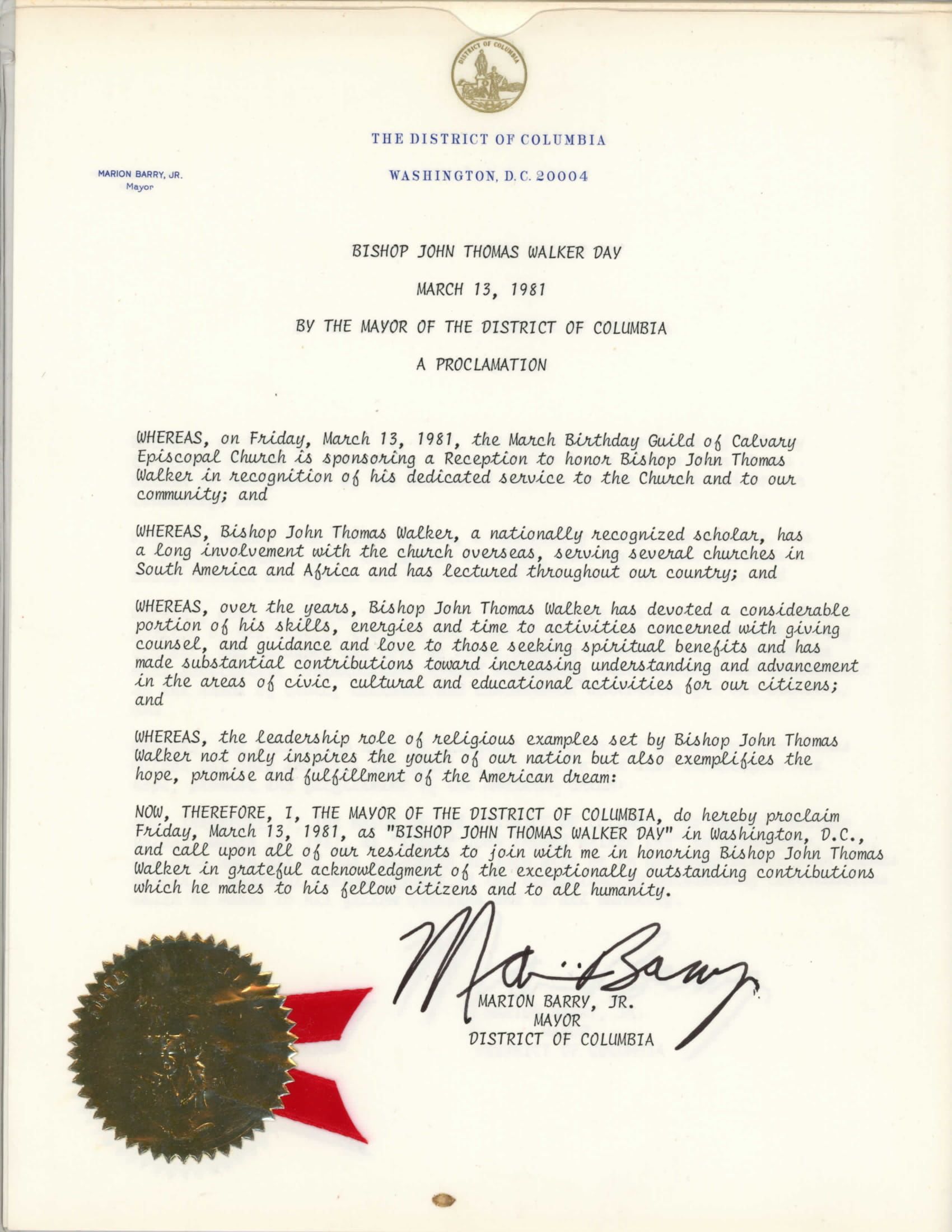
Proclamation of Bishop John Thomas Walker Day by Marion Berry, D.C. Mayor, March 13, 1981.
Proclamation of Bishop John Thomas Walker Day by Marion Berry, D.C. Mayor, March 13, 1981.
John T. Walker
Photo Collection
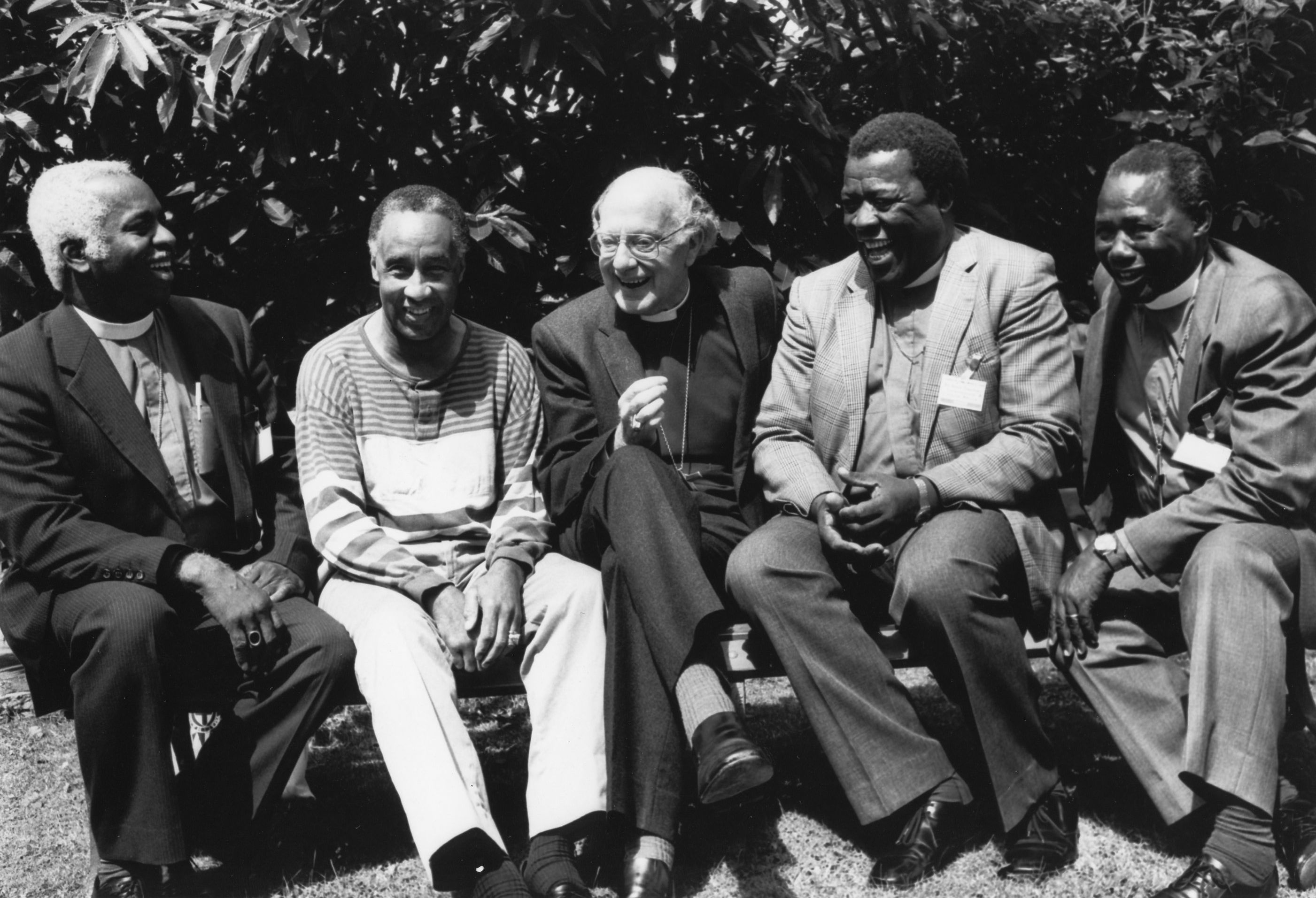

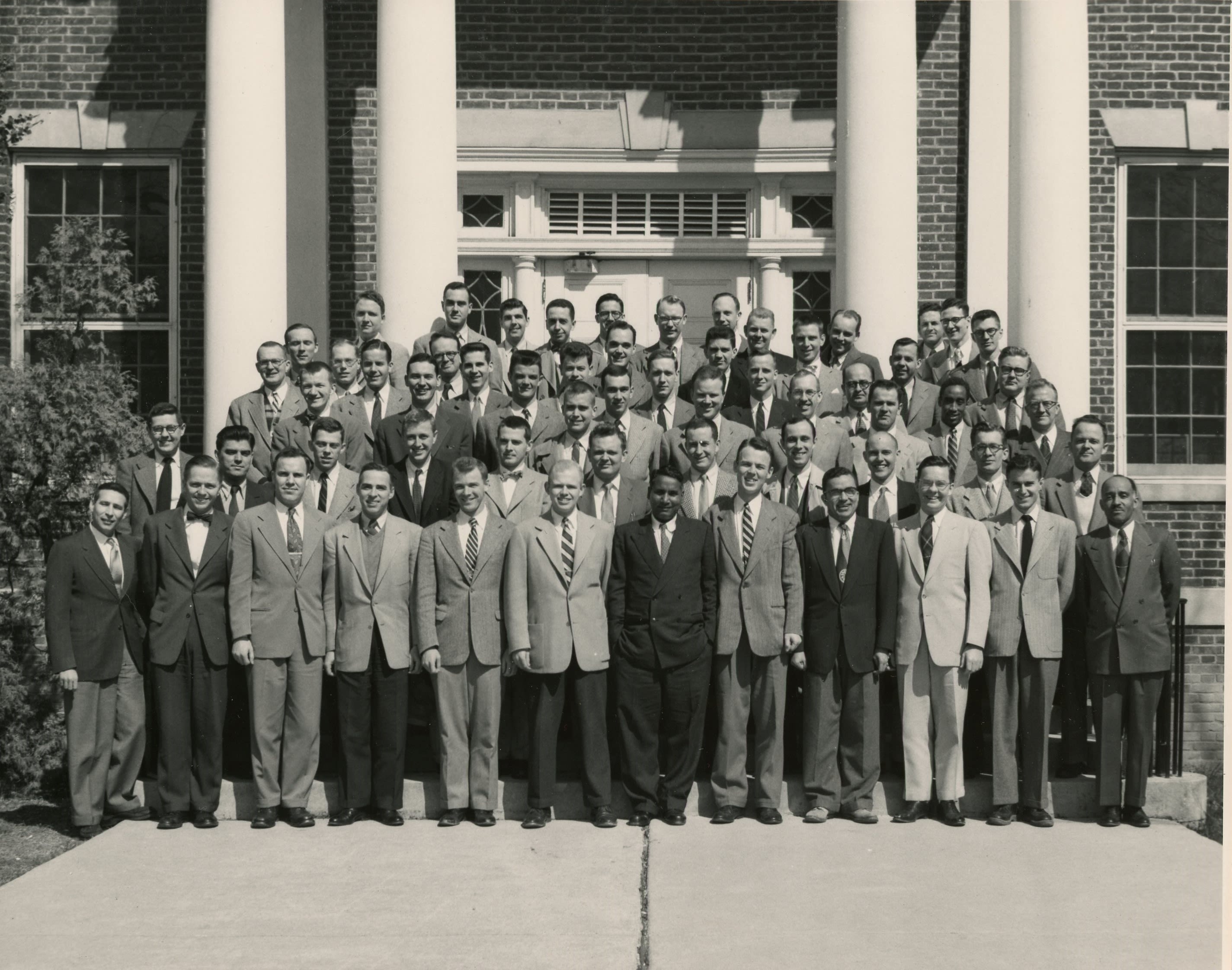
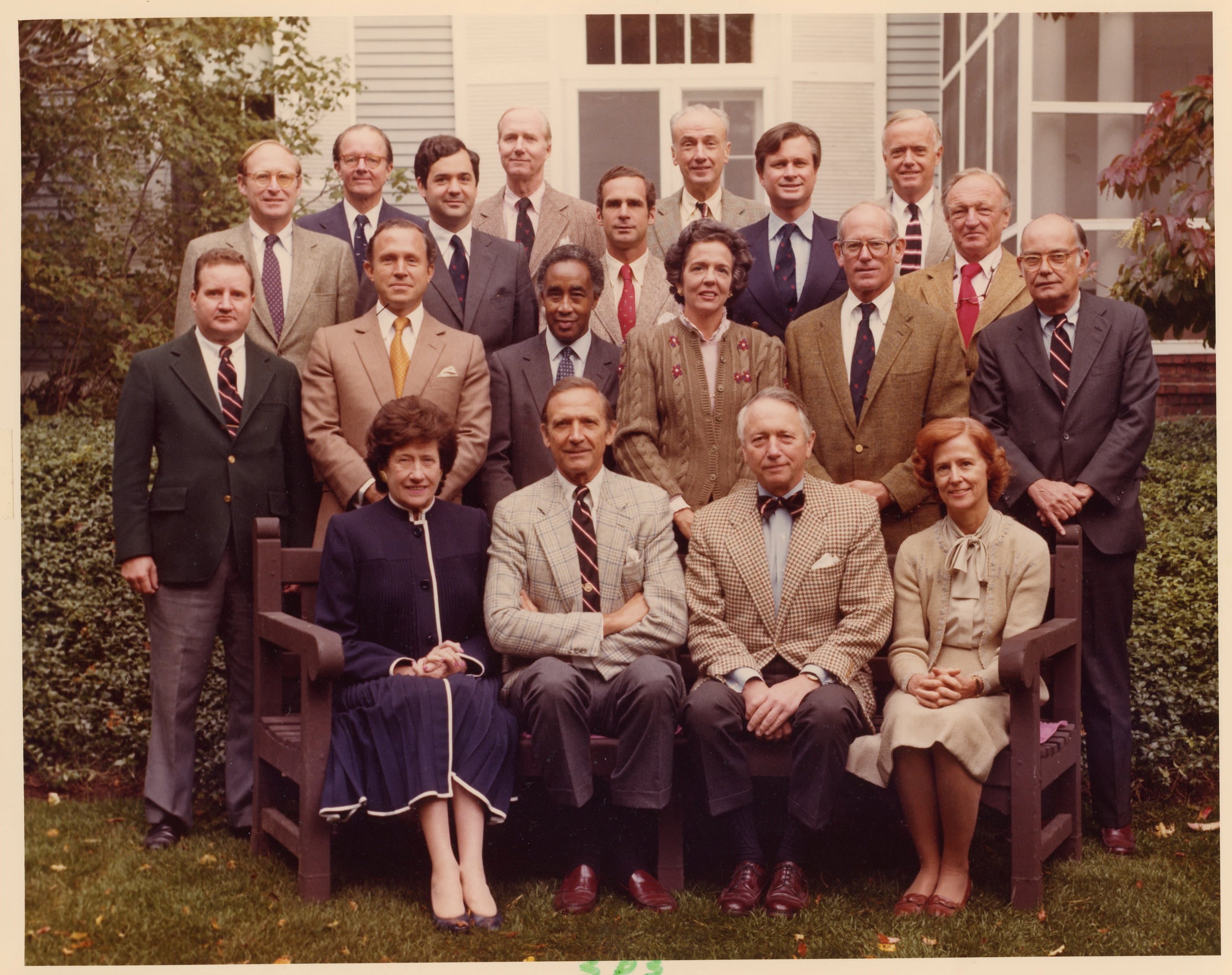

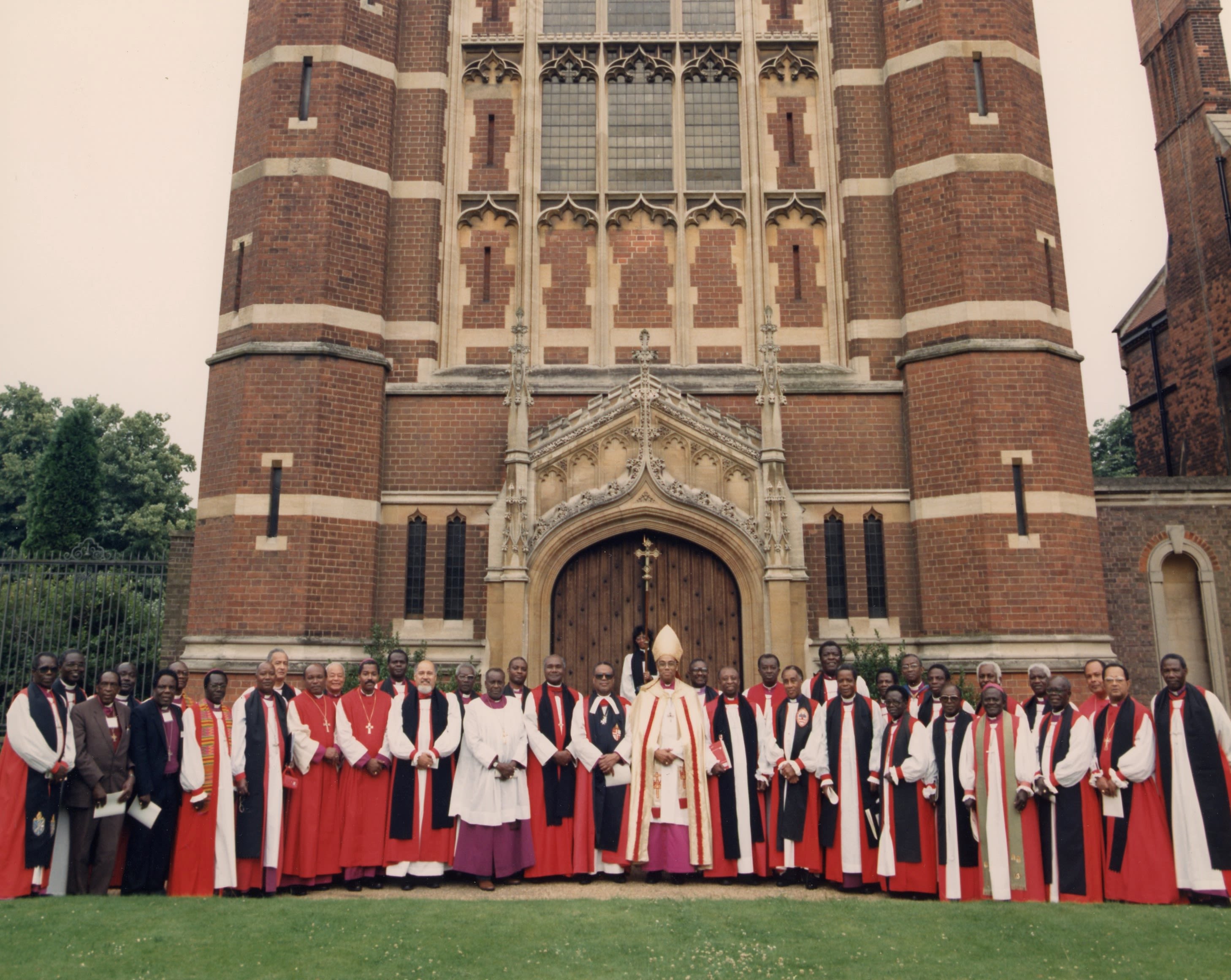
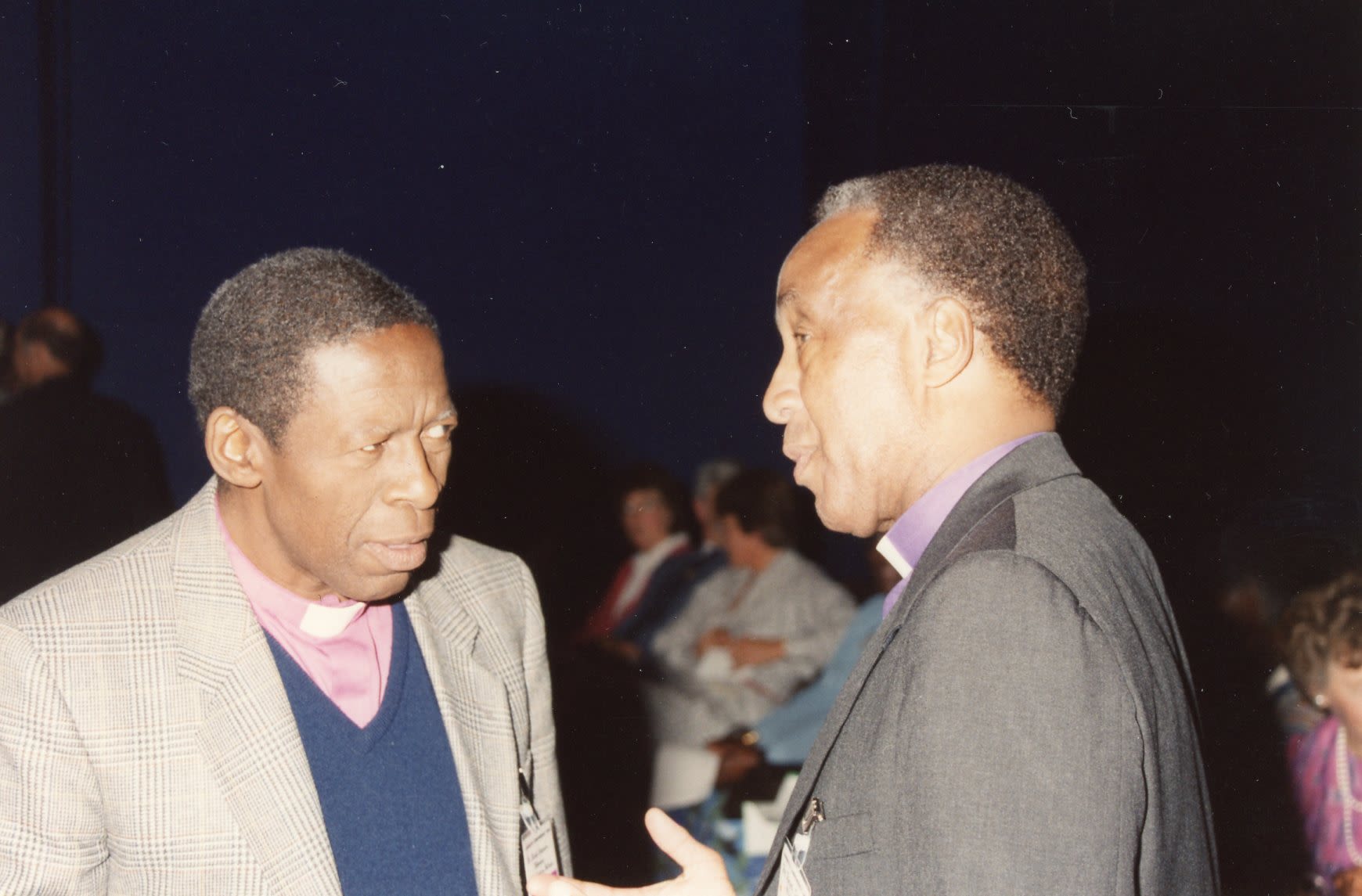
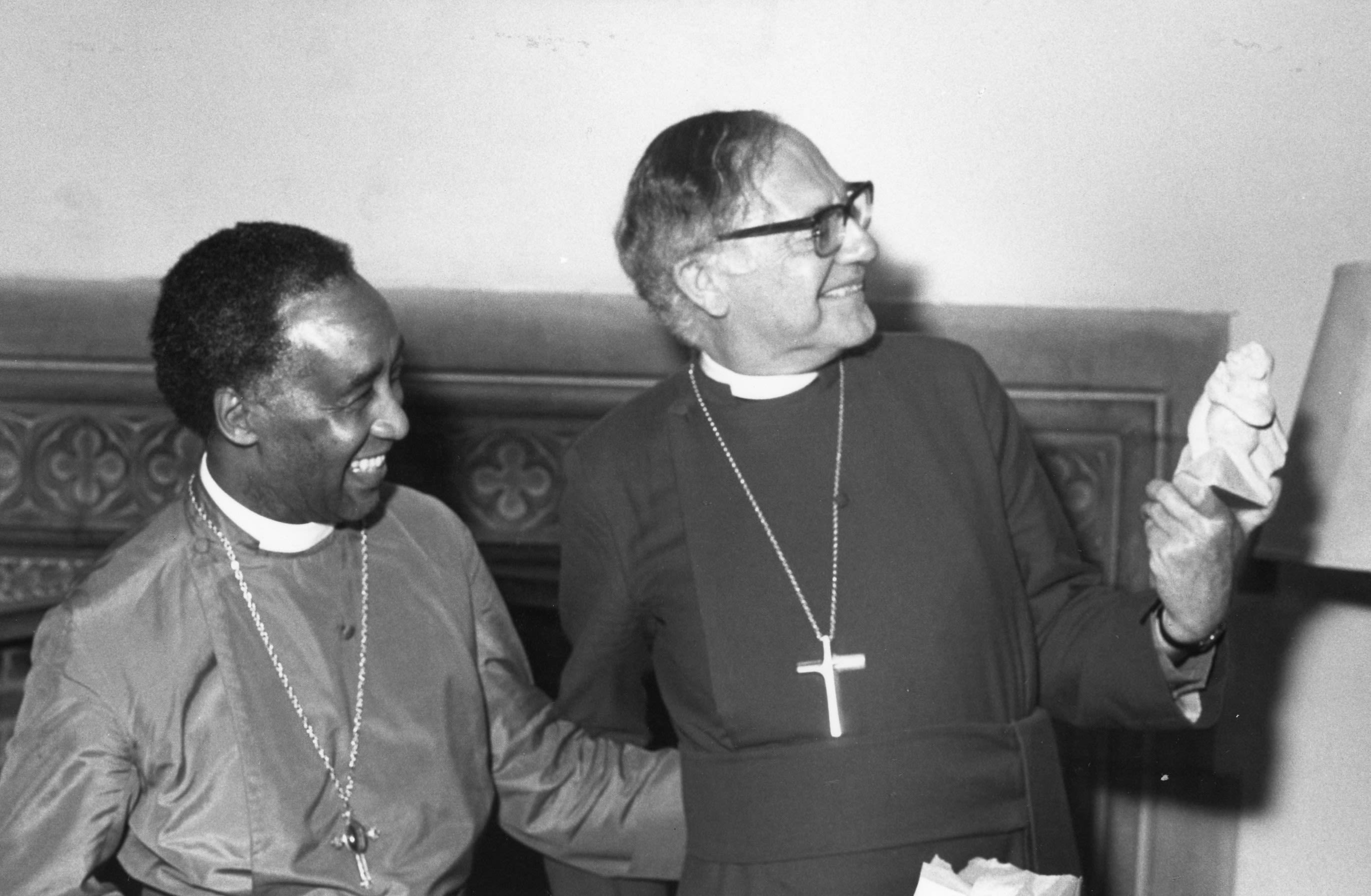
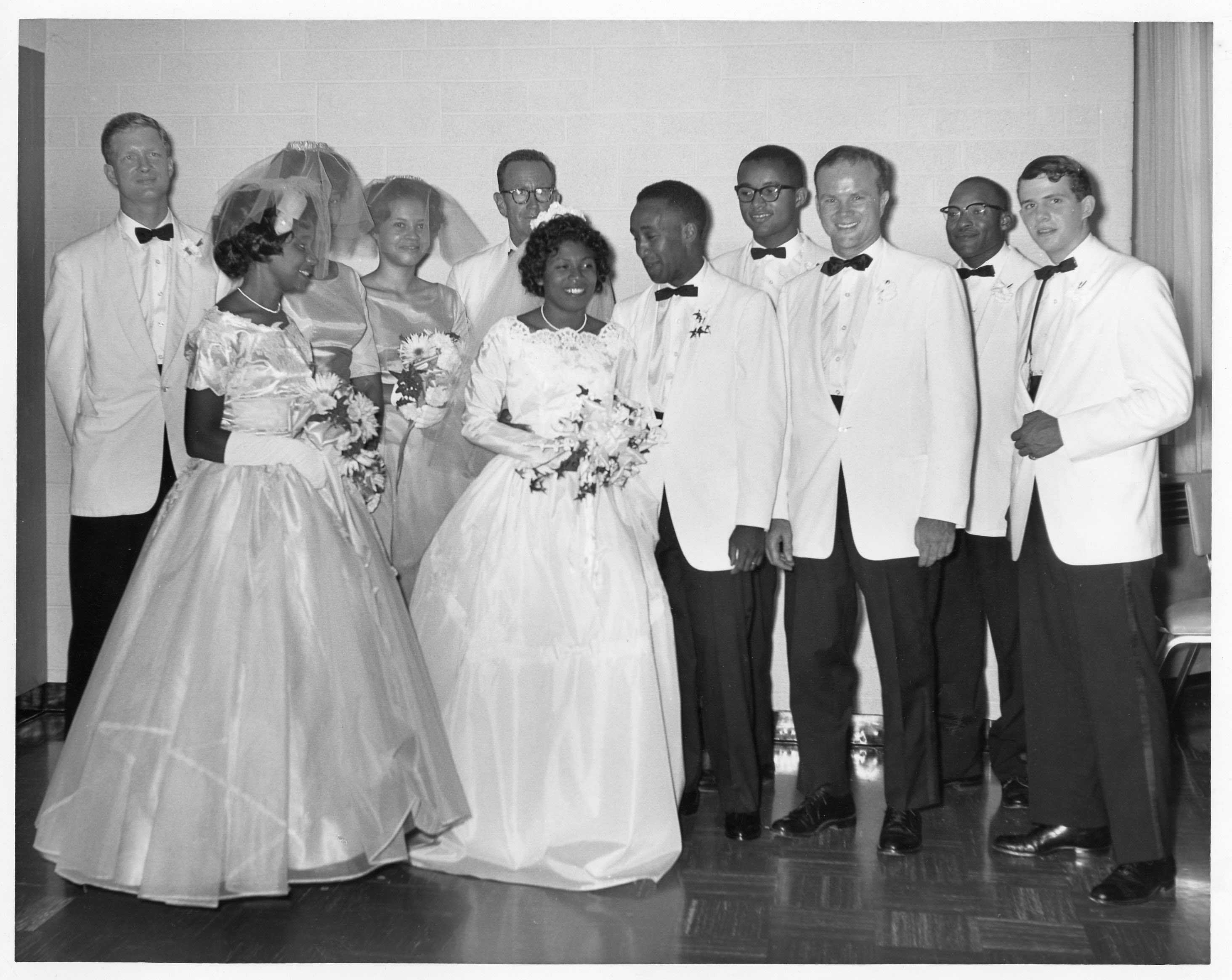
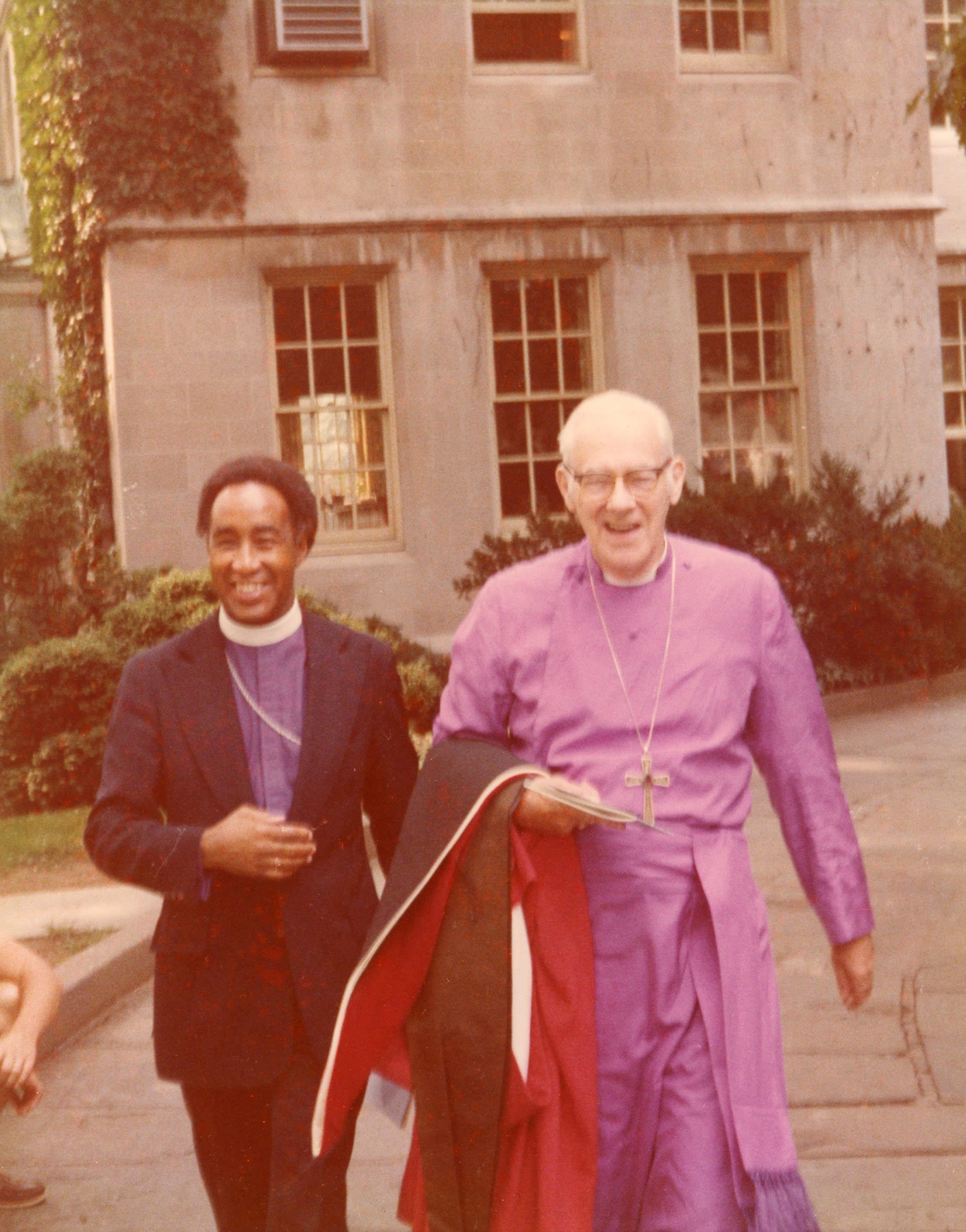
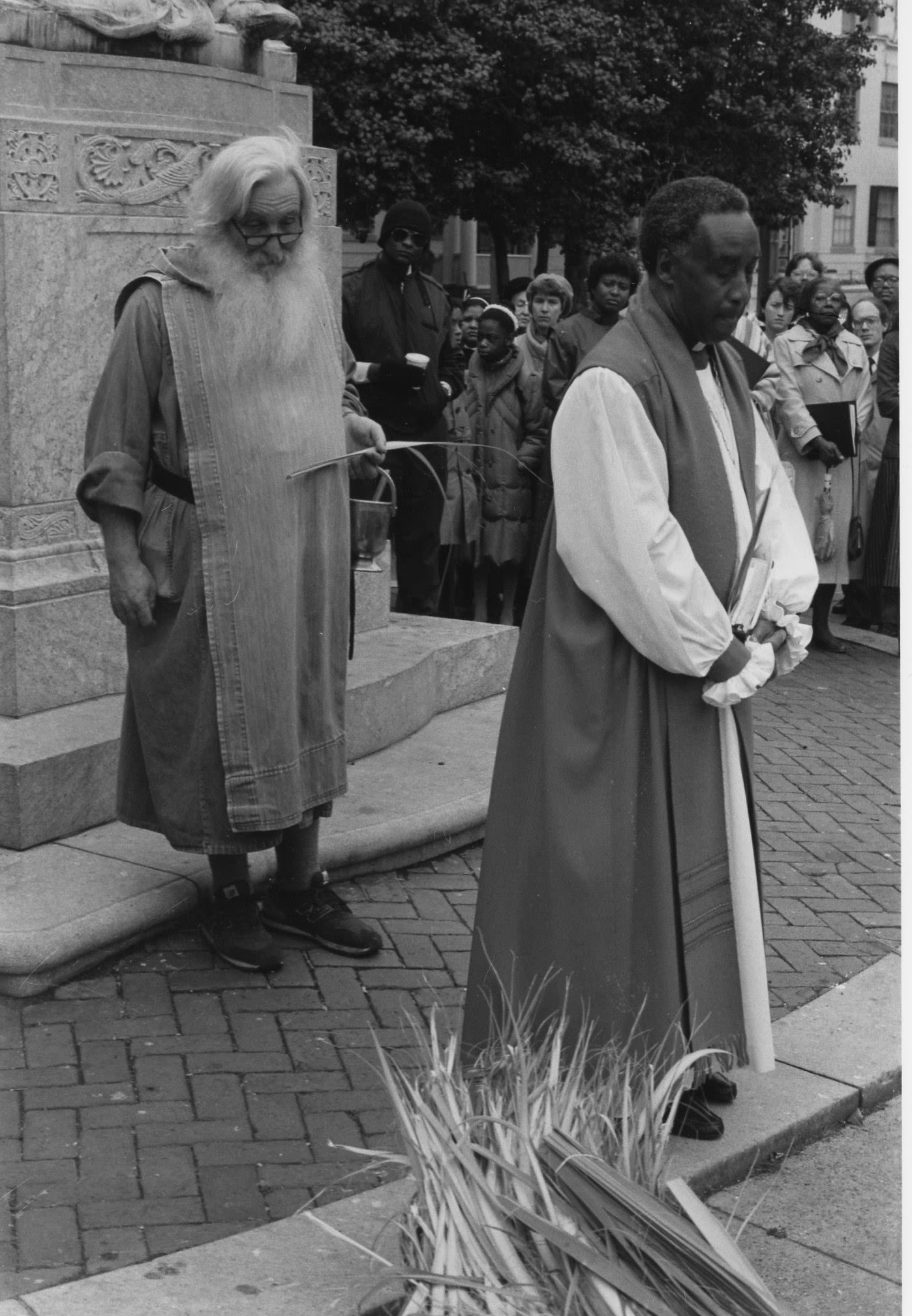
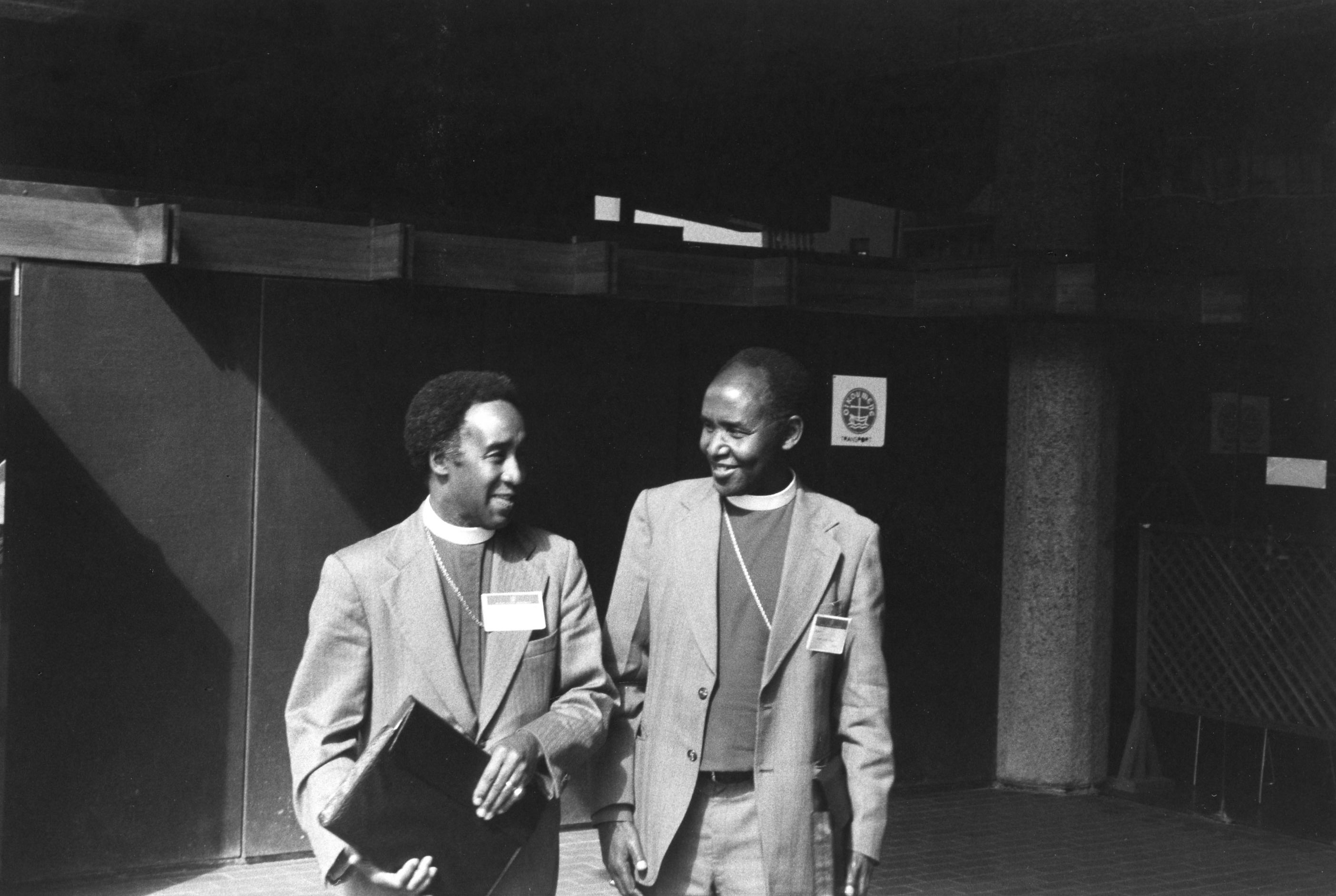
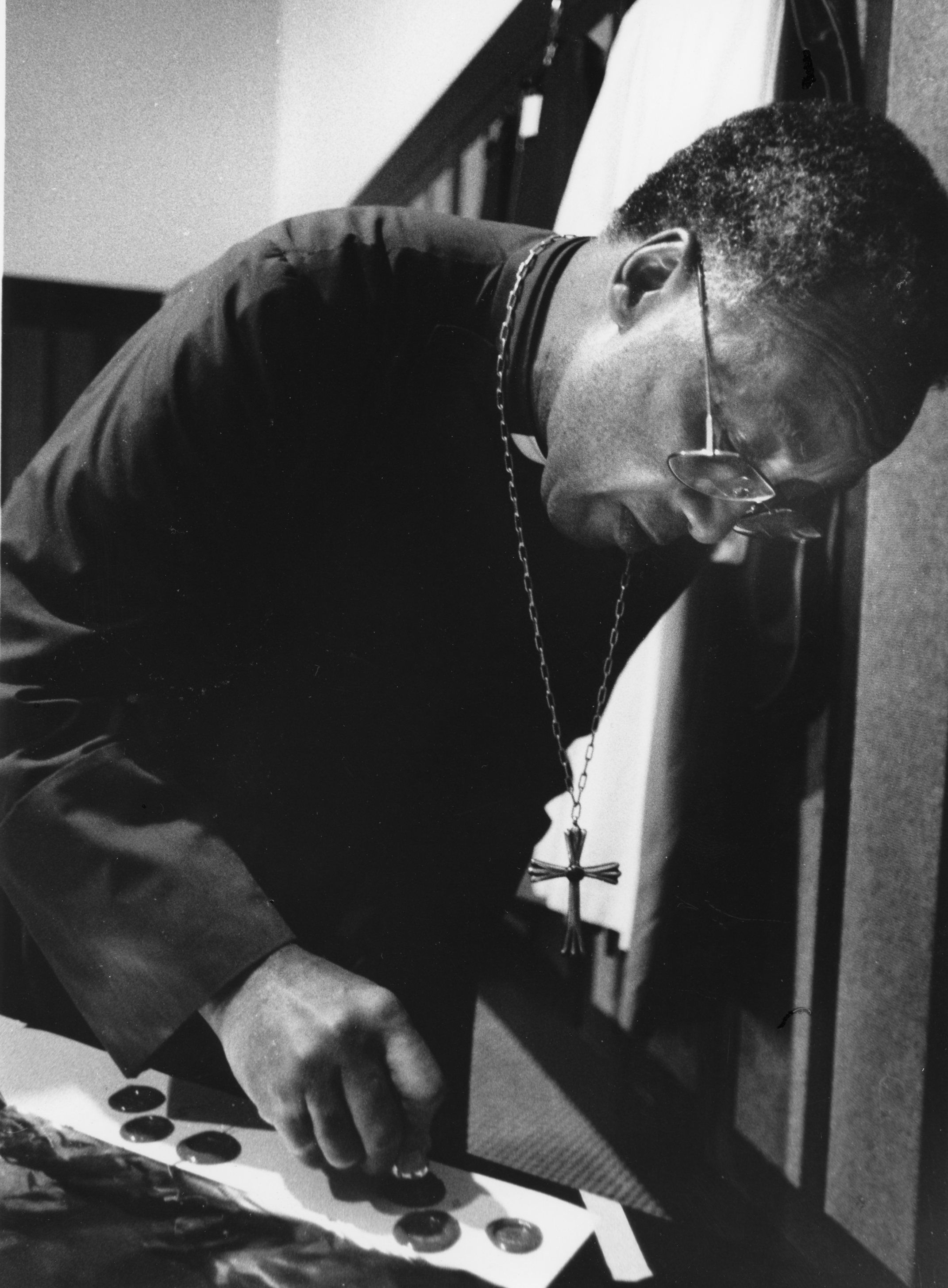

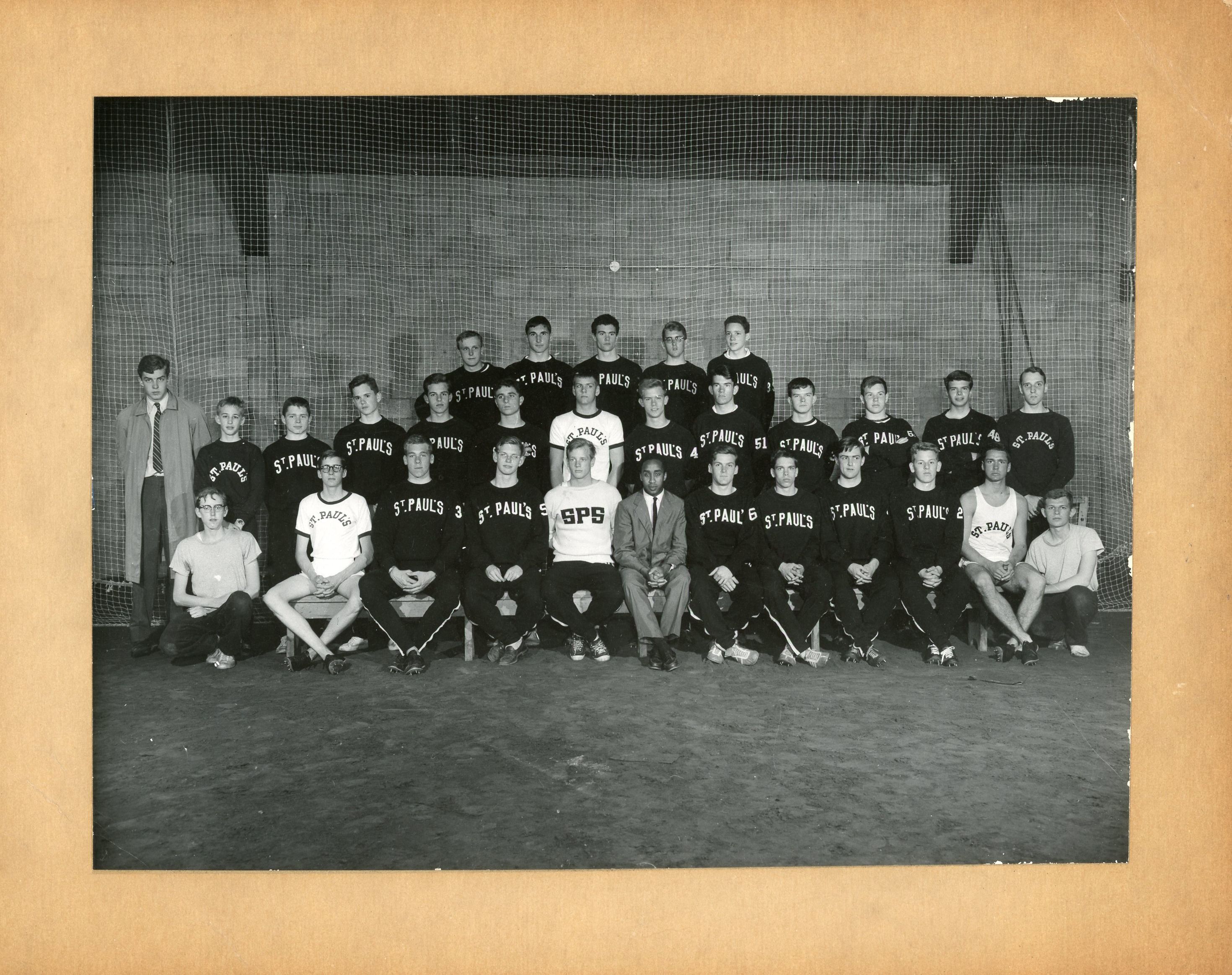
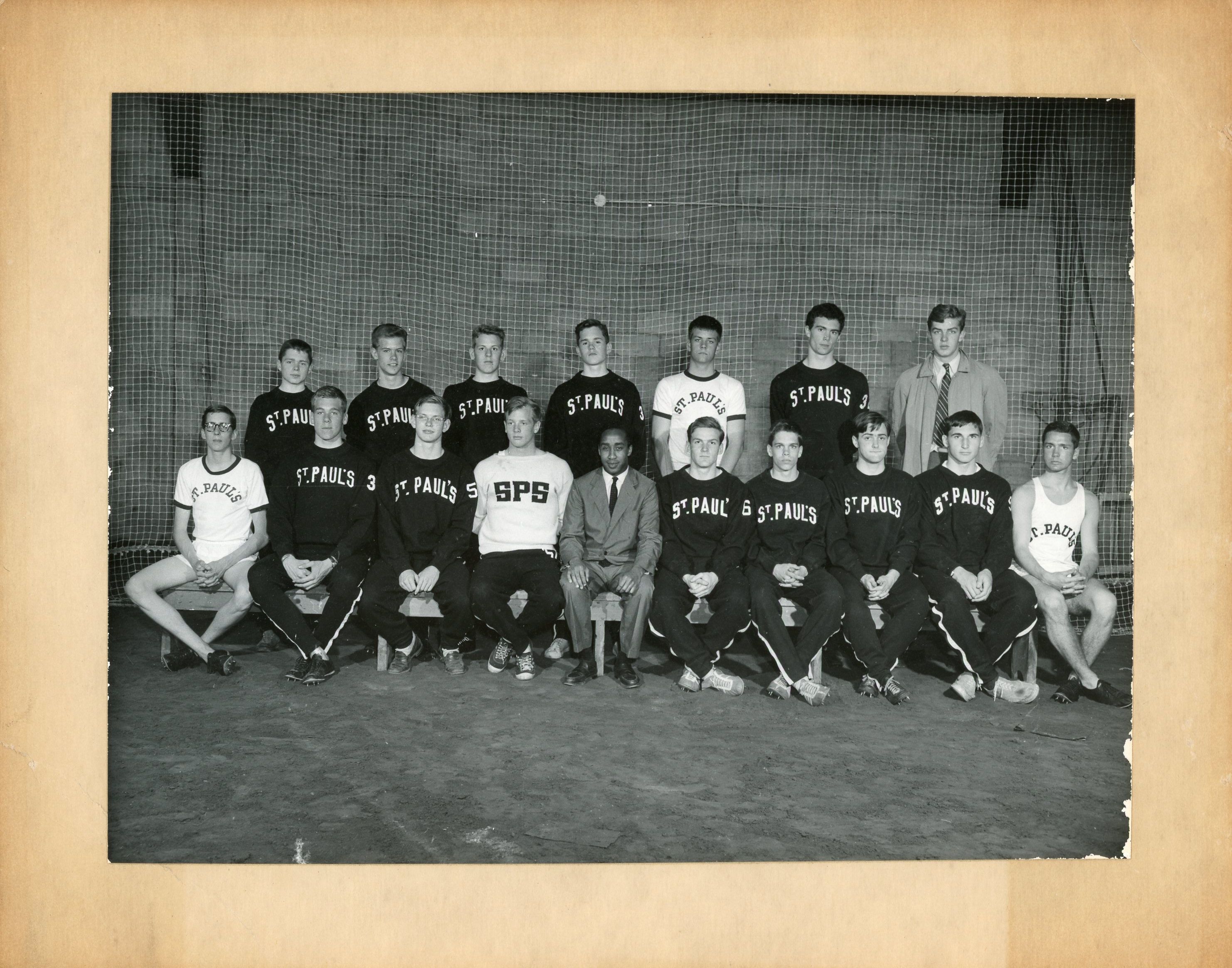
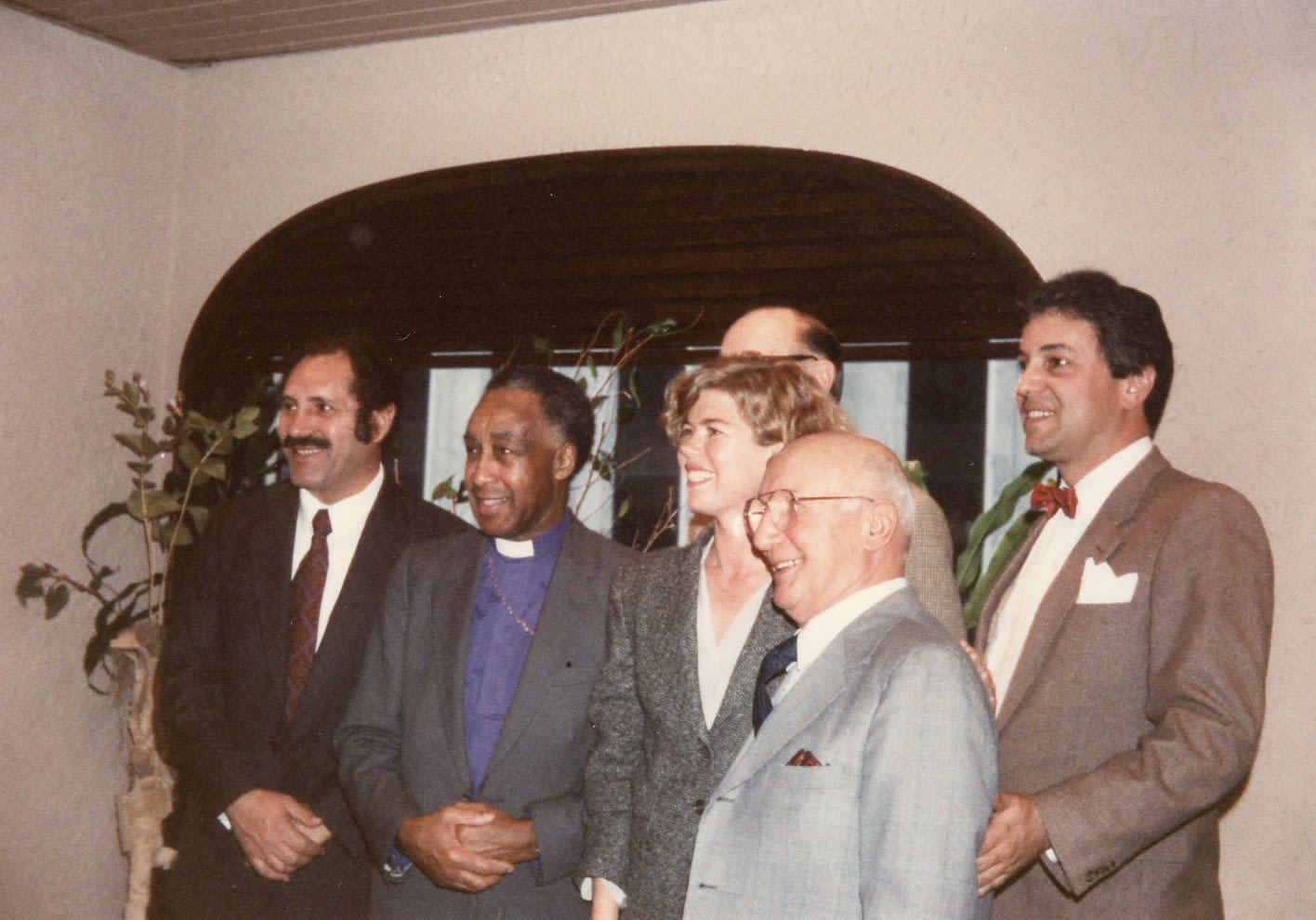

Seminary application photo
John T. Walker's incoming student photo.

Virginia Theological Seminary Class of 1954
Virginia Theological Seminary Class of 1954

St. Paul's School faculty/staff
St. Paul's School faculty/staff

At Lambeth, London, with then-Archbishop of Canterbury Robert Runcie (center), 1988
At Lambeth, London, with then-Archbishop of Canterbury Robert Runcie (center), 1988

At Lambeth, London, 1988
At Lambeth, London, 1988

At Lambeth, London, 1988
At Lambeth, London, 1988

At Lambeth, London, with then-Archbishop of Canterbury Robert Runcie, 1988
At Lambeth, London, with then-Archbishop of Canterbury Robert Runcie, 1988

Marriage to Ms. Rosa Maria Flores, 1962
Marriage to Ms. Rosa Maria Flores, 1962

Walker with Bishop [William F. Creighton]
Walker with Bishop [William F. Creighton]

Palm Sunday, 1985
Palm Sunday, 1985

Walker with unknown bishop
Walker with unknown bishop

Walker applying seal to consecration proclamation
Walker applying seal to consecration proclamation

Walker with unknown committee
Walker with unknown committee

St. Paul's School Athletics
St. Paul's School Athletics


Italian American Foundation Luncheon, Dec. 2, 1986
Italian American Foundation Luncheon, Dec. 2, 1986
Learn More:
- Visit the physical exhibition on John Walker set up in the Bishop Payne Library. There, you can view these images, letters, and documents up close and in-person.
- Visit the VTS Archives at the Bishop Payne Library to research John Walker's papers. To inquire about the collection or set up a research appointment, please send an email to askarchives@vts.edu.
Bibliography:
- Constant, Joseph. No Turning Back: The Black Presence at Virginia Theological Seminary. Brainerd: Evergreen Press, 2009.
- Harrison, Robert. Transformed by the Love of God: John Walker, a Man for the 21st Century. Cincinnati, OH: Forward Movement Publications, 2004.
- Lewis, Harold T. Yet with a Steady Beat: The African American Struggle for Recognition in the Episcopal Church. Valley Forge: Trinity Press International, 1996.
- Williams, Arthur (ed.). Black Bishops of the Episcopal Church, 1874-2004: Biographical Sketches. New York: Office of Black Ministries, 2004.